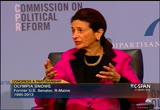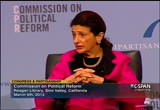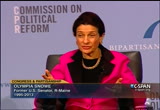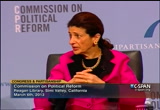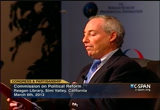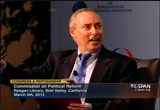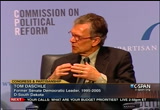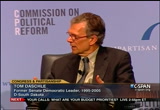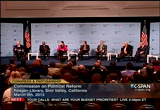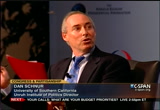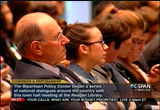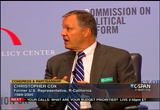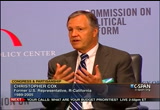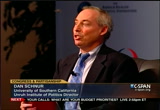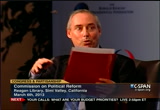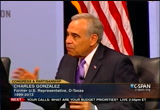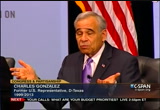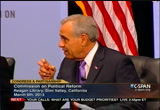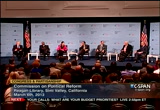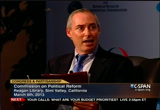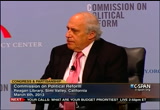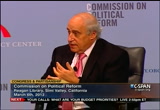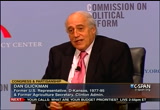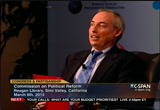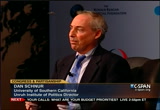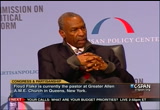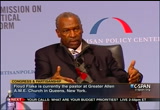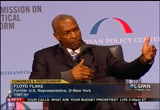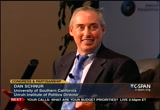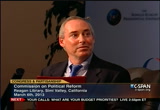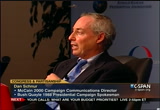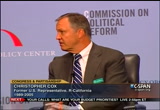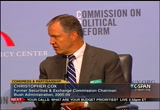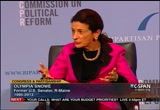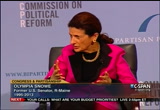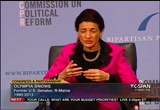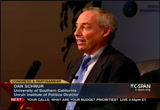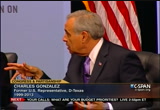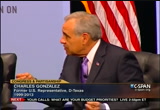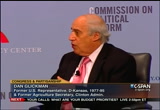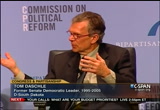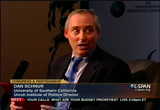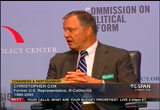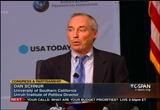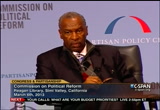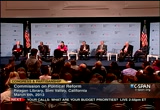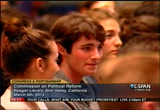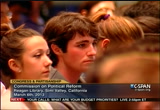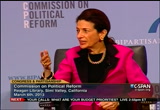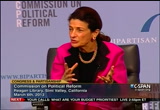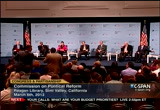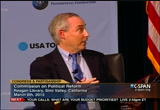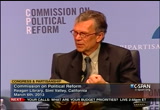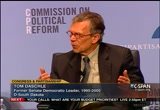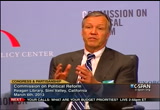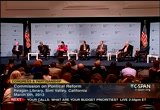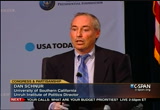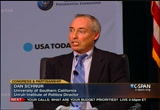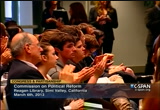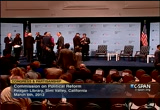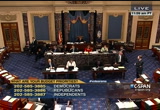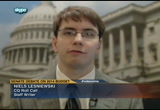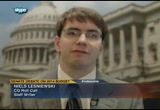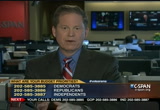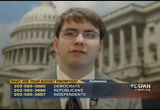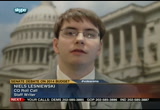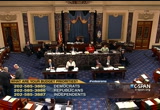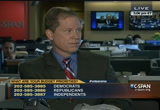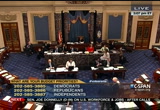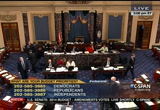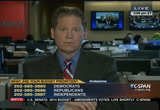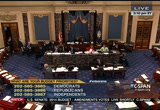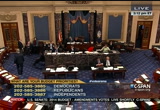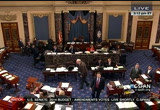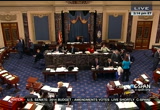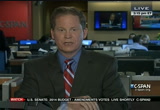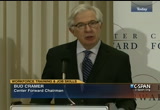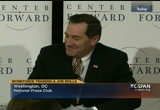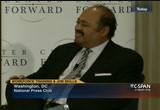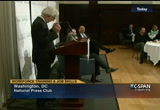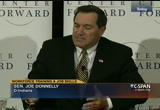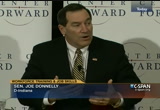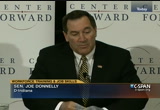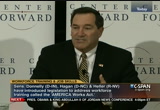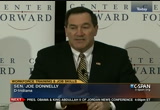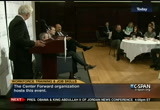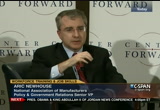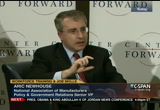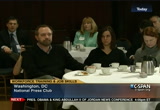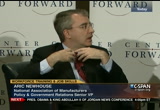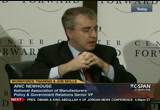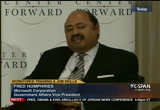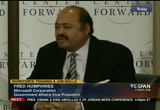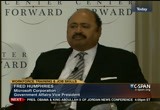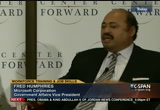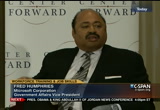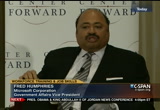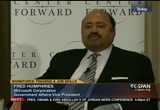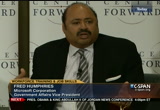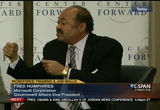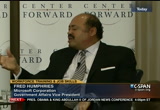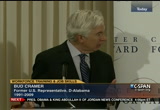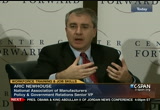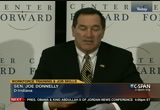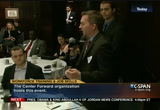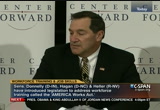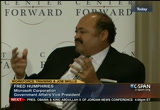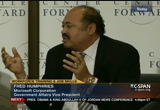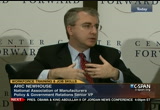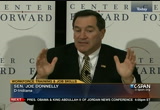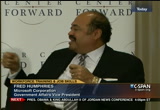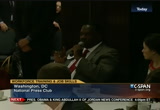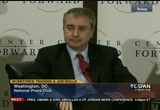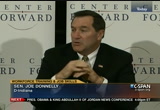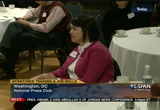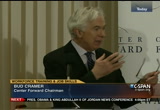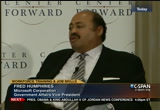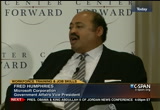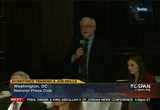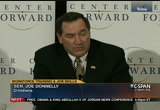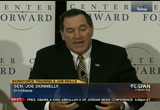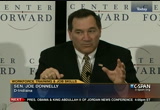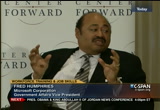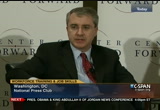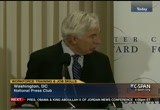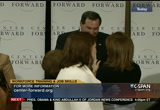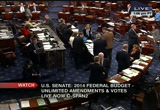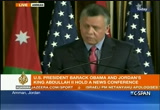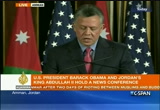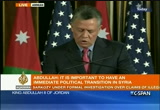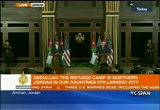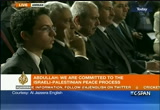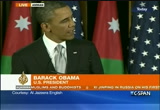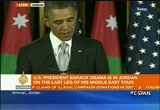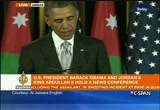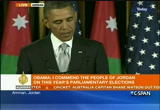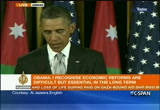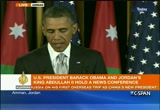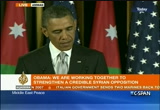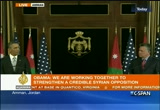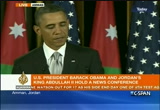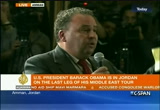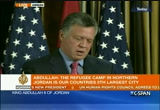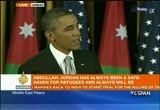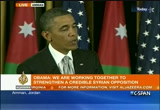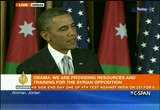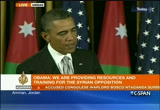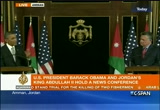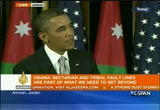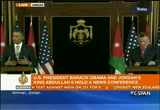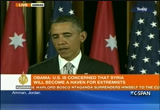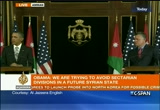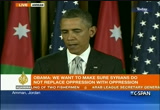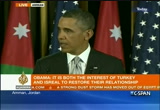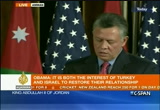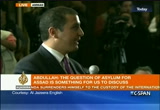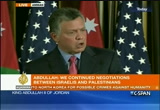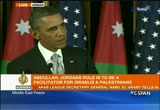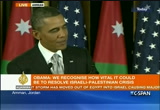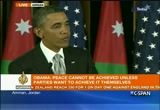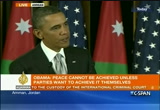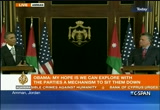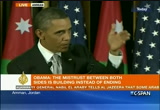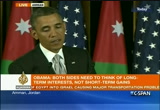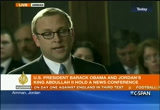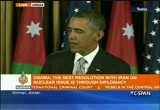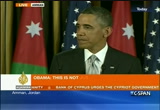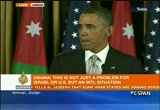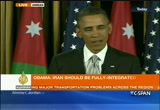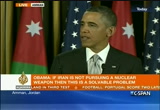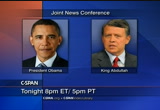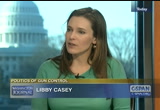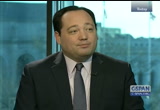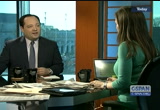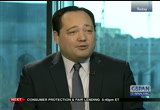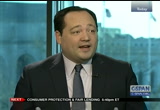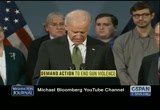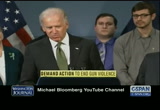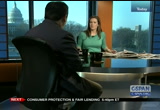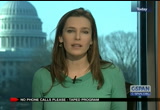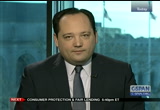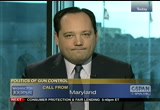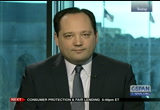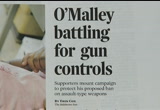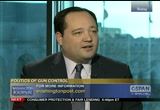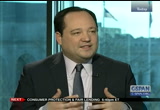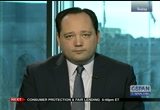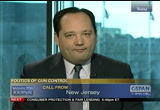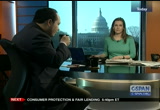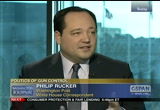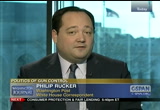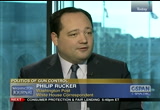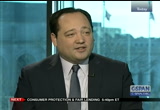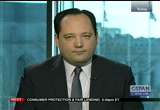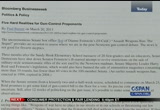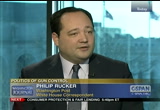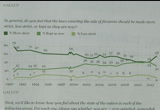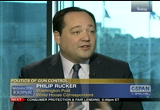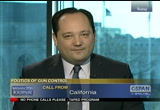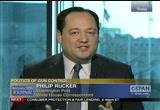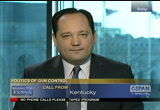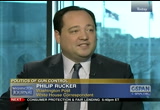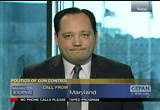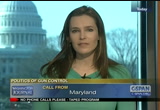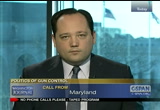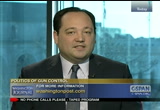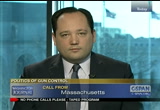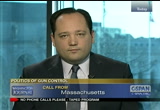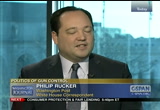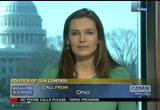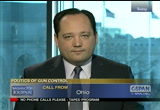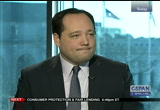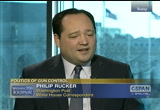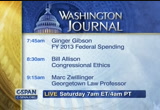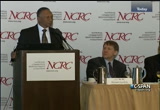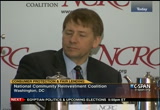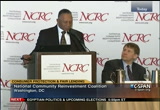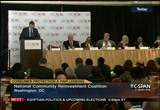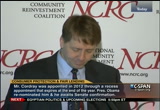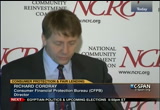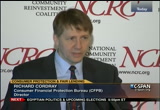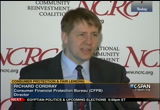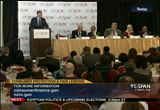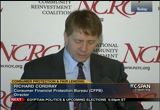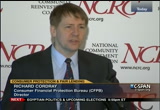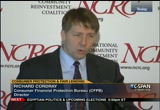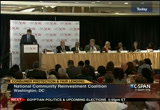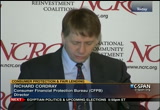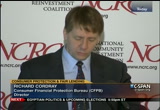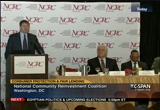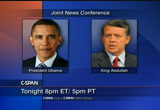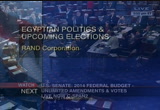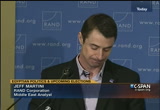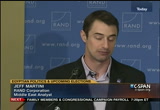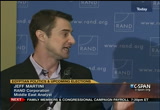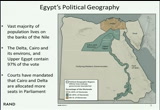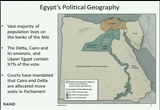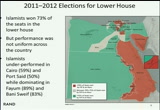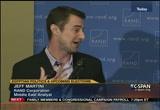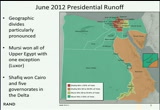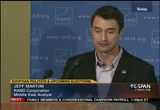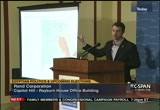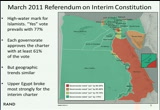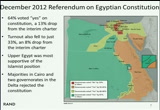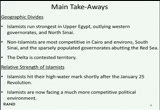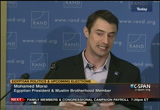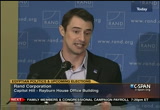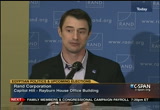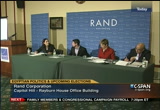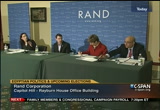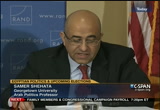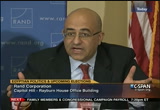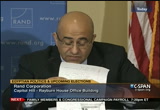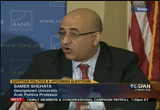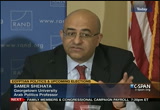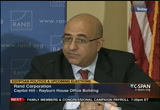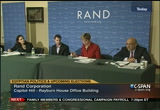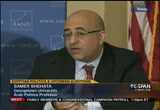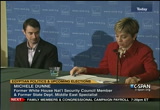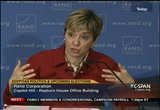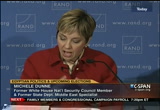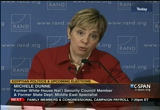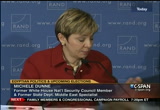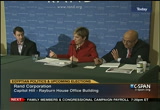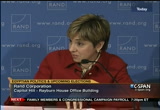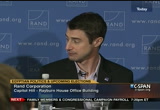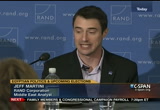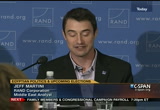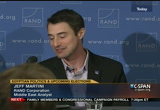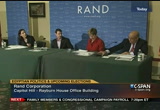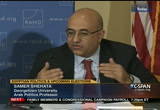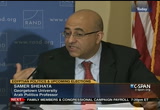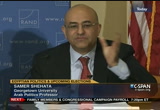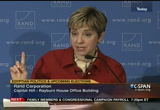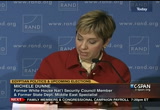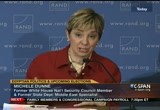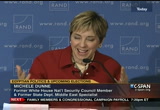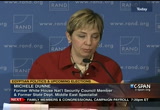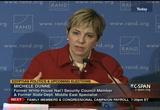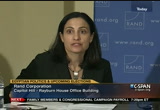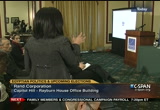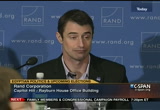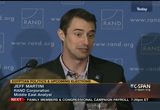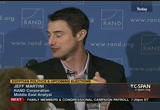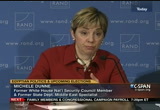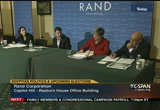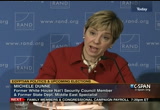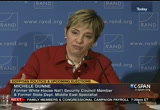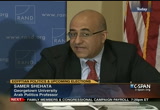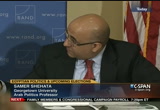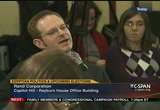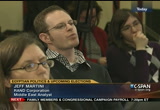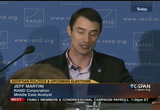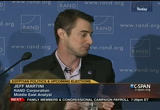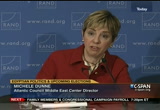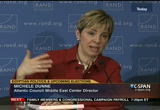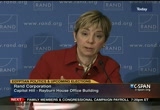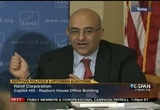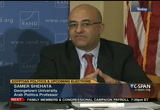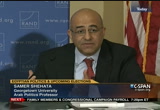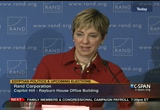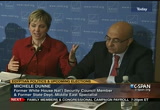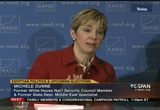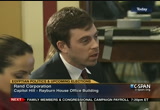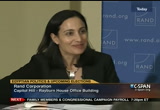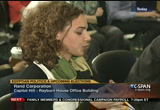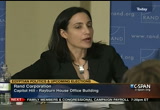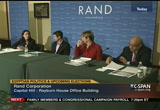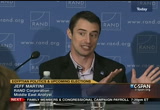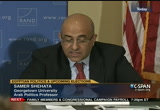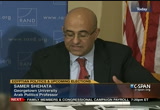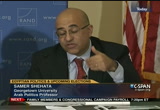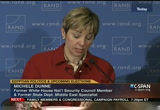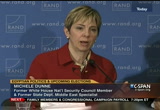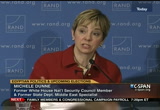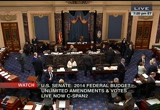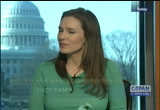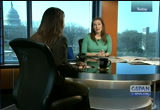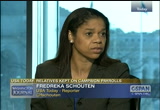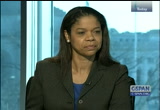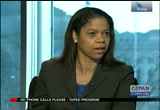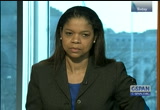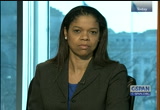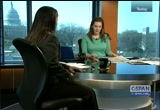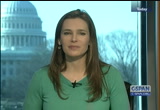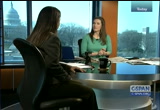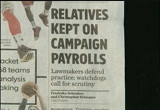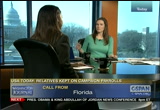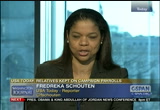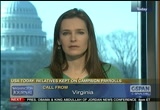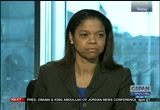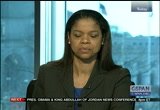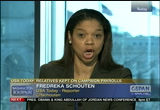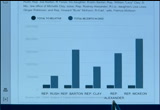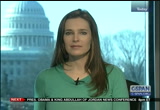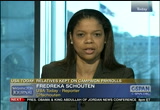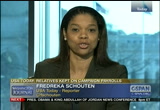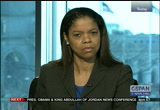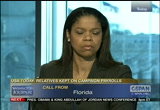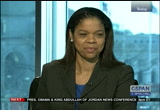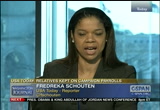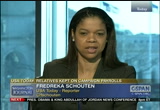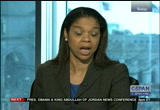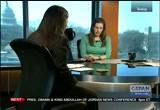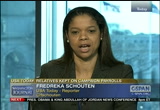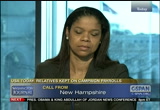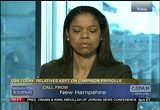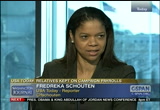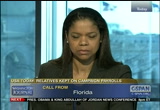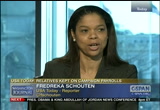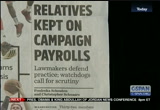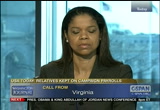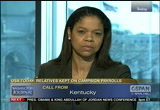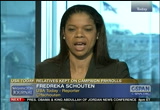tv Politics Public Policy Today CSPAN March 22, 2013 2:00pm-8:00pm EDT
2:00 pm
frustrations to me about what is happening in washington. they want to know what they can do about it and how can we change it. d i have told them and scythed example after -- cited example after example. t's only in recent years we've seen the debilitation of the legislative process. i think it's important to engage the public as we are doing and getting ideas on how we can reform congressionally and politically as well as reform. that's important. and that's why getting a spectrum from the public across the country is going to be crucial in this regard. and then the other part of it is using and harnessing the social media to make your elected officials accountable. there is no reason they ought
2:01 pm
to be taking recesses when they are facing a sequester frankly. the debt ceiling back in 2011. half our time in the senate between january and june, half of our time was not spent on legislative business. in fact in 2011 alone, it was one of the fewest number of days we've been in session since 1992 and here it was coinciding with one of the event that created the highest level of policy uncertainty of any event over the last 20 years, surpassing the wars, surpassing the financial crieses, september 11th. just to name some major events. and that debt ceiling debacle did more to disrupt the public's confidence in the
2:02 pm
integrity of the political process in washington. so you have to make your elected officials accountable. have you social immediate yafment you can build an online community snainsly and you get a message multiplire. by doing that you can find out where your law makers are. are they in session five days a week? they should be working. these are things you can be doing now. these are simple solutions but concrete ones. how can you deal with the issues of our day in two and a half days a week. the house is in session 11 days in february. we can make elected officials accountable here and now. those are some of the first steps. then we talk about redistricting commissions. open primaries i think is crurblee. we should have by annual budget. no budget, no pay. we haven't had a budget in three years.
2:03 pm
imagine that. the list gos on. i could name some others too. >> before we go on, i've already messed up my moderating duties. we are going to put on screen now the fist poll question of the afternoon we're going to put to our television and our online audience. the question as you can see or will see in a second is the congress envisioned by our founders still able to meet the changing need of our country. and the key word is anal to meet the changing needs. i think it is a strong no is it meeting the needs. ut is it able to immediate the needs. the forms are being streamed on bipartisan website.
2:04 pm
later in the program i'll read some of your twitter comments and we'll take live questions from people here at the reagan library. first i want to get back to the panel. senator dashle, senator snow aid out a range of usele reforms. she said essentially it hasn't always been like this. in the past there has been a way for the members in both parties to get along in spite of ideological differences. you and i were joking when you were majority leader that congress functioned perfectly. no one disagreed on everything and it was all comedy. i might be exaggerating slightly. but in all seriousness let's
2:05 pm
agree that the challenges in government that will always exist seem to be more difficult to surmount today than they were a decade ago and i'm wondering if you can talk about what has change add whand can reverse those trend. >> that is my story and i'm sticking to it that things were perfect. there were a lot of things. we dealt with a series of crisis. we had an impeachment crisis. we had a 9/11 crisis. we had an an thrax attack in my office. when you have crisis like that it brings people together. i think partly it was the circumstances and the environment we had to confront. devissive had very times. the schedule has changed a lot. we would work longer weeks and people were there for a longer period of time.
2:06 pm
the venues for communication were much more readily at hand. we had -- we used to have two lunch tables that are just for senators and you'd is it family style and people would have lunch together. and for whatever reason that lunchroom was closed. we used to have social events where we get together and one was around our spouses and we'd salute or spouse. we'd do things like that. but i think the single biggest thing people leave washington so much more routinely on thursday or friday and don't come back till monday or tuesday and you are left to govern on wednesday. you can't govern a country as big and sophisticated as this one is one or two days a week. they have been in session 11 days in february which we've got to ground the airplane. we're going to have to say
2:07 pm
you're going to have to stay here. maybe what we ought to do is have blocks of time where you don't go home at all. you are there from january to june and then maybe come back in august and try to work through november or something but you have big blocks of time where you are going to stay there. i think what happens then is the socializing would start all over again and we'd be able to do things where we would great the venues for communication that ultimately lead to cooperation and trust and then finally to enactment of legislation. we have to find better ways with which people can create routine communication and that's been lost. >> a fascinating point. i hope to explore it further in a moment. if you think about it the senator is talking about changing rules can have benefit. what i hear you saying is at the core of it is the ability
2:08 pm
of people to get to know each other, respect each other and get comfortable working together even if they don't always agree on everything. >> congressman chris cox you traveled to caug every week for many years for some reason. it probably took you longer to get from your home district to washington than just about any other congressman in the united states. ppose as the organization no labels has suggested instead of a tuesday to thursday schedule. what if congress stayed in session full three weeks of the month then had a week of the month back in the district. ou get the same time tpwhack your district. -- back in your district.
2:09 pm
are there ways you can suggest to get people from different side to work together better? >> i agree with the objective. first, you need people around in order to talk to one another. if you've ever been in the congress, in the house or conjugalries and watched. it fascinating to look down on the floor and it looks like a whole bunch of people milling around at a cocktail party. but what is going on is a lot of different transactions in all these little groups. it would be a fascinating thing for a political scientists because they are exploring these issues today to somehow in real time capture these conversations and see how much is getting done.
2:10 pm
it can't happen if people aren't there. you need a work schedule. just yper part ship isn't limited to congress. it isn't just about the limitation of the rules or schedule that congress follows. it's going on across the country. there is a fascinating study by an academic at stanford that asked the following question of adults throughout america. would you be concerned if your child married someone of the opposite political party if you're republican and they were to marry a democratic and vice verse. in 1960 less than 5% would be concerned. in 201040% said they would not ant to this to happen.
2:11 pm
you can over lay this on the question about race. would you be concerned if your child married someone of a different racial group. 1960 only 5% would be comfortable with marrying outside their group. today 80% are comfort wble it. the nation is much more tolerant of diversity and one another in a social sense, but politically we are more intolerant than we've ever been before. this is something that members of congress deal with because they come from this country. we've got to deal wl as a society as well as the institution of congress. it starts with the lack of sivety that's been introduced into the discourse about political matters through the proliferation of unminded
2:12 pm
infill tainment. i'm sure there will be ample time to talk about this in subsequent sessions. but we can put a finger on a lot of causes outside of congress. congress in order to to work is going to have to notice this, realize it and take affirmative action to get themselves out of that bind. >> i think that is a dead on point. it critically important. a "new york times" columnist talks at the me network and how in this age of technological advances every one of us can construct an information environment that only reinforces what we already believe. if you think about it, it's human nature. i want to reach out to the smartest people in the world. i want to read the smartest people, i want to listen to the smartest people. who are the smartest people?
2:13 pm
the people who agree with me. depending on who you are those people hang out on fox news or msnbc but really on both. congress makes a point that creates a particular challenge for members of coonged i'm fog to come to congressman gonzales on this. schwarz talks about most citizens are not and should not be bipartisan. it's their elected leadsers who should be able to reach across ideological lines to find opportunity for cooperation. chris cox is right. we live in an i pod nation as voters. how much harder does it make it for congress to reach out across party lines given those
2:14 pm
challenges and what can be done o make that challenge less onerous. >> that was talked about earlier. the context is in my belief that american society is undergoing tremendous transformation and change at a time when we have downward economic mobility. that's a dangerous mix. we haven't done a good job of being leaders. many things happen to people that want to lead. many times when they lead, the result is they are no longer in the leadership position. whether that's the way congress or the electorate defeets you on a single issue. it's about bipartisanship. 's not about non-partisanship. i'm always going to be a democratic. when i was born i was bap tiesed asia democratic.
2:15 pm
that's not going to change. what do we have as legislative tools. forget about the position that may or may not cost you the election. we can talk about that. but we had a long discussion last night. i frulely believe in the house. i have no idea what goes on in the senate, only what i read. but the question comes out committees. chris and i served on financial services. so i got to serve under a couple of chairs, jim bleach and mike gossly. i'm on energy and commerce now. but it was the inclusion of the minority in the legislative process and it was at the committee level you really blished your relationships. i know whether we spend less time or more time in washington nothing is going to work unless we come together at those times when we really get to know one another. in my opinion that is at the
2:16 pm
committee level. if we can do something and work something there. i'm not sure how leadership exerts its leadership on chairs and ranking members of committees and subcommittees. but there in lies the answer. it's a tremendous strength. i've always been hopeful that the chairs and the ranking members would understand the importance of including the minority. you know what happens when you are in the majority, you are going to win every one of the votes. it's just the way it was. but things change drastically. that is one of the answers. i don't think that we're ever going to get away from being partisan. your question of whether willing tons compromise and that you will survive an election because of the fact that you compromised. j.f.k. wrote the book profiles and courage. he couldn't write that book
2:17 pm
today because he wouldn't have any subjects. you get defeated on a procedural vote much less a substive one. >> i think it's a critical point the distinction between non-partisan and bipartisan. someone who is non-partisan says higher taxes no taxes, no big deal. amnesty, deportation, whatever. but i think it's not about people abandoning their principles but finding common ground with people, even if they can't agree on everything, finding some things on which to agree. >> i was just a house member. >> president clickman. >> if anybody else would like a promotionless us know. we have another half an hour. >> members of congress as
2:18 pm
congressman talks about get elected to represent a district. we could have a long conversation about redistricting and about how in most states in this country if you are elected in a seat that is overwhelmingly a democrat or republican you are never going to lose that seat unless you compromise with somebody on the other side. but two people get elected by everybody in the united states. it seems to be i know this is something you've thought about given your time in the president. a president of the united states has a unique role to reach out to both sides in congress. without getting into a current events debate, i think we can agree looking back at the president after who this library was named, president reagan and the president after
2:19 pm
whom the last stop on this tour, president kennedy both exempfide an ability for presidents to work across party lines and try to bring the two parties together. talk if you can a little bit from your perspective in the house and in the administration about the role a president can play in helping members of congress over come the challenges others have talked about. >> i think we focus on the congress and we forget that half the government is the executive branch, taking the court out. you can't because it's a key part of the thing. you can't talk about the operation without looking at the whole government and that deluss president of the united states. he or his role is demee this. if you lay "lincoln." you saw how president lincoln wanted to get the 13th amendment passed. the only way he could do it was
2:20 pm
to manipulate and bribe, which we can't do today, to try to persuade the congress to go along with him. you remember the scene he send a fwy out to find the guy he would give a post master ship to if he goes his way. and he ultimately votes with the president. the role of the executive branch particularly in the modern world with all the complex problems we have is so completeically important because only the president represents all the people and he president is the one that congress disposes. you have to have presidential engage. . you talked about president reagan did this and president johnson did this and in my judgment president clinton did this remarkably wem.
2:21 pm
and i think president obama is getting better. today he's meeting with 13 senators tonight at the jefferson hotel in washington. which maybe our conference helped move along. but it is tough -- i want to mention one other thing. it's tough because it's hard tore deal with the congress and sometimes it's unpless tonight deal with the congress. but there is no other choice, the president must engage. but one of the other issues i want to raise quickly is another factor, and charlie you talked about this a bit. in the days we were building this country, the space program and all these wonderful things it was easier to work together. let's look at the things they are dealing with today, sequester, how are we going to cut medicare, social security,
2:22 pm
how are we going to get the budget down. these are tough. these are politically difficult positions to take. in an environment where everything is just cutting and reducing, it's not natural for people to enjoy doing the job under those circumstances. they don't necessarily feel as positive towards each other and friendly to reach out for common ground. i think that's another factor why it's so difficult for people to get together. >> thank you, we appreciate it. > i'm going to come to the reverend last. fortune of od attending a service a few years ago and my salvation is about
2:23 pm
expired so i'll be coming soon for renewal. i think you can take this to a broader level. senator snow made a couple of important points but the one that stuck with me more than anything sells holding politicians accountable. several people on twitter have made that point making sure that the elected representatives remember who they represent. you left congress some years ago because you believed there was a better way to make a difference in a community in society. from everything i've seen and read, part of that is making sure that your parishioners understand they play a vital flole holding your elected officials accountable. maybe you can talk about the best way of reminding a citizen, a parishioner, a voter or non-voter who is busy and has all these other obligations
2:24 pm
in life that politics is too important to be left to the politicians and they need to be involved too. >> it is not from politics but where i came from the early stages of my life and that is dealing with the reality that relationship matters and that concept of relationship matters in congress was very help to feel me. because when i had an issue, it was generally a means -- it brought me to a place where i had to talk to some other congress people. i had a part in trying to deal with the loans crisis that was under my subcommittee. i realized this was a major challenge. i could not do it alone. and a lot of my colleagues on the other side of the aisle had issues with relationship to how the process was going to work. because i think chris and others would say, when reverend flake came into the house every
2:25 pm
day, he greeted everybody and shook hand and wrapped his arms around everybody. by the time you get to a problem you should have a good relationship with the people you are with. i don't see that happening in the congress today. there is not that kind of relationship and further more, we had our thursday group where we met, republicans, democrats, we had our own little worship service every thursday morning. democratics came and republicans came and we got to know each other. whenever an issue came up, whether it was brought by a democratic or republican didn't matter. what mattered was we understood we had somebody we could talk to on the other side and that person on the other side generally would agree with what we were trying to do especially if they had a piece of legislation they were working on or anticipating was coming
2:26 pm
before them. and so when you lose that concept of the value and meaning of relationship, whether it's in business, whether it's in politics, whether it's in anything, you lose that ability to have that support system available to you which and i think that's one of the things that many of the younger democrats and republicans that i see come into congress, they are coming raw. they don't seem to have the kind of background skills that gives them that capability to understand that we are in this thing together. part of my life, i spent 7 years with exocx, i've had to manage people. and managing people the first thing you learn, the only way people eed is you get on your side early on and then you can solve the problem when the problem comes about. >> we've been getting questions
2:27 pm
via twitter over the first thirty minutes of the panel. one of the questions i picked out which has been answer sd what role dizzyvillety play in getting things done between the two side of congress. each of the panelist has addressed that in a way. if we can put up the answers to our poll question. is the congress envisioned by our founders still able to meet the needs of our country yes 49%, no 51%. if i were working in politics this would be my cue to call for a revote or recount. the country is very split. in other words, the hopeful but skeptical. hopeful we can do better but skeptical the officials can. i'm going to make this a
2:28 pm
lightning round in order to to get to aud consequence consequence. i'm going to open up a question from michael s. what are the one or two top actions we can take to restore competent government? i think every one of you has talked about the broader principles of trust and cooperation, the role of the voters, the role of the executive. when it comes to nuts and bolt changes, changing rules that can create an incentive for people to work across party lines, i'm wondering if anyone can offer a legislative or statute toir change that might help the process along and grow the kind of trust that you've all talked about. and that is a question i'll open up to the floor. >> we've talked a little about this already. but i would say that the two things that would have the biggest impact would be the
2:29 pm
money chase and how much time we spend trying to raise money and how much time away that takes us from the legislative process. and then i think the way -- the primary system today and the effect that it has on members. we've created an intimidation that is very concerning to a lot of members. they are worried about losing a primary, not a general but losing a primary. if i were going to address one thing it would be the money and the way we elect the people in our political process today. >> money and primaries essentially means redistricting reform. many years ago in 1999 i worked for the presidential campaign of senator john mccain. what i learned is if you take the word campaign finances reform and string them together
2:30 pm
enough times you can take the most politically obsessed audience in the world and put them to sleep. kind of thingst the that voters wake up and think about. they think about streets and parks. a question for any panelist, how do you get people, voters, to focus on something that sounds like inside baseball, but could have a profound effect that the senator is talking about? >> one way to do is to let everything go to hell, which is happening now, and they can say how come we are not fixing this proved to provide a bookend for the focus on the campaign money that candidates have to raise, we can focus on what dan manchin, people's money, that congress is responsible for
2:31 pm
appropriating and budgeting. the government might not be responsible for everything, but they are certainly responsible for our money, and they are responsible for allocating what they collect from taxpayers. as the secretary general has said, rationing is a painful thing that puts everything out, the process can help. kinds of rules can we put in place? we operate on a budget process that was legislated in 1974. whether it was ceded to the time, other people can argue. this is a lightning round so i say it is not suited to the current time, it is badly broken, and republicans and whocrats baptized that way are principled and not going to
2:32 pm
change should disagree about what our priorities of what the spending are, but not about spending money that we do not have. we need to force those choices and let people vote on which ones when. >> to follow up, i think that having competitive primaries is extremely critical, because people otherwise are left with note choice other than those candidates who are really on the right or left, because of the way the system is designed. they take that frame of reference to but the house and the senate and you cannot get people to realign and work together and solve problems. it is one thing to have the party positions out there and voting on them, but when they fail, where you go next? if they are not willing to move forward, try to modify the legislation, reconcile the differences, you cannot move
2:33 pm
legislation forward, and if we cannot move the country forward. the whole budget process. it is exhibit a under dysfunction. in the senate, and a sense that we have not had a budget in three years. that enforces discipline. we are required by law and the budget resolution, a statutory requirement by april 15, and we have ignored it for three consecutive years. that has to happen. it is not as if we have been overwhelmed in the past with our schedule. i decided that this morning. the only thing that was predictable was our recess scheduled. we had sufficient time to address these issues. once you lose the discipline on that factor, you lose your discipline on everything else. the idea of no budget, no pay, which is endorsed, hopefully
2:34 pm
goes forward, it is one way of forcing the accountability on the part of elected officials. but it has to happen. people should demand that they are there five days a week, and as tom was saying, a certain senate when tom was majority and minority leaders, and we had a 50-50 senate in 2001. and the tie was broken by vice president cheney. we got through it. there were a lot of bipartisan initiatives. he did a great job. we confuse our differences and we cannot do that anymore. i think that we have to return to the basic and demand that appeared on thursday, you could smell the jet fumes and everybody is out of timown. for our guests and audience, i will put in a quick
2:35 pm
advertisement for california's redistricting reform which has taken steps to create competitive districts that our panelists have talked about. also the primary, which sends the top two vote getters on to the general election time regardless of party. kind ofates the competitive elections and accountability our panelists have talked about. very threat knocked -- a not very thrilling conversation for someone who does not obsess about politics to come to the reagan library in the middle week to hear a conversation like this one, but critical changes in the rules that can ultimately create accountability we have talked about paid we can go to audience questions in a few minutes, but a few of our panelists have not had a chance to win in on a question from twitter about a
2:36 pm
structural or statutory change that might be made to encourage cooperation. any thoughts? >> hoop is posing the question feels that there is a procedural rules that we can do and how we operate in the house and senate that suddenly will make it a place where maybe there will be compromise and there will be consensus building. in the house i go back to our committee structure, but i would like to turn that around and ask the electorate and that particular individual who submitted the question, to empower their representative, to be flexible, to compromise, and not the big price of the primary. that is what i see on the house side, no flexibility, no wiggle room. they were collected saying a certain thing and when they get there they have to be 100% pure on that issue, even if it is
2:37 pm
just that one issue. >> if you think about it from a clinical cost-benefits that point, being intractable and inflexible and unwilling to compromise under any circumstances is a smart career move. >> it will get you reelected. -- you would be surprised in conversations you have, because the sense is that maybe if you enjoy a better relationship, but even with that, they still have to go back and there will still be a primary, and we know how that works. it is a question about maybe the voter being somewhat -- i did not want to see better educated, but you understand that an effective member has to negotiate and has to compromise to come to some sort of final product. otherwise you will never get a final product. >> i agree with -- what is the
2:38 pm
biggest problem we face today that we are just stop gone? it is this fiscal crisis, the budget. families are looking at it and saying i have got to deal with this all the time, and you guys cannot deal with it. the biggest thing to me would be the leadership of congress to recognize that the budget aocess has to be utilized in way that gets this issue resolved, because if we go every three months with more in decision and 11th-hour -- making, thetizen frustration that people have to live their lives and cannot figure out the process, it will drive them nuts and treat the most negative phillies in the world. it is the responsibility of leadership to make this process
2:39 pm
work, and they have to act like leaders, like tom daschle did and some of the other folks. >> changing the rules might take the incentive structure, but ultimately is about the men and women who go to washington. >> i would like that ad on something that olympia and dan had said, that budget process is completely broken. there are three layers. first there is the budget, then the authorizing, and the appropriate process, and none of those are working today. ever pass anything authorizing. we have to have a major reform --the way we past budgetary we make budgetary decisions, because that process is now so encumbered. olympia mentioned this morning and it bears repeating, we have to go to a two-year budget cycle. we cannot do a multi-trillion-
2:40 pm
dollar budget and a couple of months, especially if you are only there on wednesday. we have to have more opportunity to think more carefully and constructively, and that takes year cycle. a two- i think the time has come for us to go to back something that was mentioned. in the 1970's we changed it, and we got to go back and streamline the process a lot more. >> it is a great point, and we slipped past chris' suggestion. general motors made cars to the way they did in the early 1970's, that would be a problem. before reagan had run for tom dewey'sn 1980 platform, if bill clinton had run for president on adlai stevenson's platform, these
2:41 pm
would not have worked so well. >> ronald reagan faced these challenges because he had to deal with a badly broken budget process that was a product of the 1974 act. one of my responsibilities was to draft the decision for reagan called the dutchess process reform act that would deal with these things. i introduced it. we had over 200 sponsors. we had a bipartisan sponsorship in the senate. as you can see from problems we are experiencing, the process has never changed. if you want to find something that is capable of being completely bipartisan, multi- partisan, it is fixing the budget process and a neutral way, because once you subtract everybody's passionate ideology, it is easier to come to agreement about putting a whole thing in a box and making sure
2:42 pm
there are priorities. making sure the system has teeth, because the big problem the processlow off and people do. >> we started a few minutes late, so we have time for audience questions. if anybody has a question, please raise your hand. i will ask the same thing of you, that when you stand, identify yourself and if you have a question for someone, with whom you might disagree, we ask you remember that person might be a political opponent, but not a mortal enemy, and we have to frame that question with the same level of regard that you would have them ask you. jesse.i'm do we deal with the enormous
2:43 pm
debt and a bipartisan way? he congratulated the panel on the brilliance of their presentation. [laughter] i have to agree. a little embarrassing. senator daschle, you talked about a country and its elected representatives meeting a -- needing a crisis to come together. it seems we have one. how can congress, i will ask the reverend to answer, how can we address a seminal crisis like this one? >> have to weigh the outcomes in terms of the negatives that had prevailed and make a decision that if everyone is going to that survive and if they are born to do what is best for the people, it is to everybody's best interest for them to work together and come -- and come to conclusions that everybody may
2:44 pm
not agree with but agree with that of as we did in the old days, that they can work with it and most of us sitting here know you never had a piece of legislation that got it done by first time. most of it you go three or four times before, because you have to get everybody in the knicks, and if you are not talking to people, it is not going to happen. there has to be that connection and that kind of relationship that says we are quite to do this. both sides come together and make it happen. rules, lastn, more attitude. other questions. hi, i am wondering with everything that is going on with the solutions that we have fix theto bring up to
2:45 pm
debt, it brings up so much difference in how to fix the problems politically on both sides, and i am wondering, i wrote this down earlier, if the american experiment going -- is the american experiment togoing into the fall because of party politics? >> what is your name? >> that you. >> -- matthews. >> great question, matthew. >> i know everyone believes that this is a crisis i know in the history of the united states, and i assure you we have had crises of the same dimension. in the 1960's what it was like, and the fascination of a president, -- the assassination of a president,
2:46 pm
robert kennedy, martin luther king jr. in a series of how many years. if that did not the story us, and that the not set us on the course of irreconcilable differences, i do not what would have. what we are facing today is a financial crisis, and the answer said,k it was jesse democrats have to come to the table and say we're willing to do something about social security and medicare. we will do something about spending. and republicans have to come and say we do not have a fair tax system and we are court to change the tax code to raise more revenue. once you do that, a lot of people are going to be defeated. that will be their last that the sled accomplishment if they are able to come to an agreement. -- i do not is think that suddenly it is the fault or woe is me and this is the end of the greatest
2:47 pm
democracy known in the history of this world. not at all. >> any panelist who would like to take it, but congressman makes an excellent point, we have been divided to more dramatically, but over much larger stakes come over questions of slavery, suffered, whether an individual should be counted as 3/5 of what human being. whether the top marginal tax rate is set at 31% or 35% is important, but in that context it seems like we can come together. we have one more question. i was wondering if anybody would want to talk about the scope of the challenge. we have always faced problems trick is a question of how you address the problem, how you tackle it. process often dictates policy. it really needs to start with the rank and file going back to
2:48 pm
the committee process. there is virtually no committee process at least in the senate where you are charged with the responsibility of addressing the debt question, for example, or whether or not you are going to reform the tax code, and you have a process by which both sides have to work at out. it does not come instantaneously. people have these unrealistic expectations, and lawmakers with 30 seconds think they are run to overhaul the deficit. you have to have a process. now every package we get has been 11th-hour, crafted by the leadership behind closed doors. it concentrates the power in the hands of leadership and takes at away from the rank and file. take gets you to a place where i did not get everything i wanted, but i get some of what i want it. everybody does not expect to get 100 percent.
2:49 pm
you did not expect that you are going to get more hundred% adopted. the same is true in congress. they have to reconcile those differences. the only way to do that is still a legitimate process. it has to be bipartisan. somebody is on to say, bipartisanship is not a theory, it is a political necessity. >> i am going to have to ask if we have time for one more question. we have time. you guys are lucky, at least one of you is. inwill get to a microphone one second. would you please come up here. the sandtist and on -- sanford andl don't that society.
2:50 pm
one of the major concerns in this country is the affordable health care act, and there is a lot of concern about that. i have to ask senator daschle, snowe, and not know if we will ever repealed that, but we will be able to modify it because people are concerned, increases in whenever they have to pay for their health insurance, whether they will be able to get enough health care because there will not be enough people to provide that care, because more people are on it. i would like their comments on that, because it is dividing the compuntry. toi will ask senator daschle adjust that first-rate a huge amount of debate, of vitriol, surrounded its passage, but it becomes clear that some adjustments. reasonable people can disagree to the extent of the
2:51 pm
adjustments, some will need to be made going for. maybe you could talk about what might need to be done to adjust the act. >> when it comes to health care and i think people are much more together than we really realize. there's no disagreement in our country today that we have costs, access, and quality issues of an enormous proportions. we spend more on health in the united states and the next 10 countries put together. we do not rank in the top 25 on quality in almost any other category today. not even in the top 25. we have a long way to go, and there is unity on the causes. we have real issues with regard to unnecessary care. isut 1/3 of what we spend unnecessary. we have a lot of tort reform issues. the economytor in
2:52 pm
where the time of purchase, we do not know where it is on the cost or who was gone to pay. there is a common ground on the ball. everybody wants it. we want to produce a high value of care marketplace with better access, better quality, where costs. no disagreement. the real disagreement comes on hat the role of government is in accomplishing that goal, and there lies the challenge of the affordable care act. near-ear there were two death experiences, the supreme court decision and the election. the affordable care act is the law, and we have to figure out a way to make it work better. dealing with this ongoing debate about what the proper role of government should be. we know the status quo is unsustainable. when i was born, health care was 4% of the cost of gdp. when my children were born, it
2:53 pm
was 8%. grandchildren, 16%. if i'm lucky enough to have great-grandchildren, it will be 32% of gdp. that is unsustainable. we have to figure out what is the right structure today to deal with costs, excess, and quality and all the products, and once we do that, and i am confident we can move in that direction if we do it in a collective and concerted way. >> i want to congratulate our questioner for helping us put our finger on the intersection between the very significant policy issues that tom just laid out and the process and the rules and the way congress functions that have been the subject of this panel. if you think about the affordable care act manufacturer, how it came to become not only is it merely unique in its size and scope as a monumental piece of legislation, many, many pages,
2:54 pm
very difficult to read and understand, and so on, and took a lot of work, but also it was rtisan that her early par manner. it is wise to do a little listening and make sure that both major parties are involved. you could say the same thing about the dot-franc act. all the major legislative accomplishments that i had were bipartisan, and i would not have been able to accomplish big things in conagra guest if i had not worked across the aisle. we make a mistake as a country and the congress when we try to undertake these big, big game- changing things without getting from the major parties together. but we have quite a few more questions. this leaves us two options. we can continue the panel to a length that will satisfy me, but
2:55 pm
unfortunately we cannot stay quite that long. our second option is it is time to wrap up, so in just a moment, i will ask you to thank our panelists. i'll take a moment of privilege. almost 30 years ago i drove from my home in wisconsin to washington in order to work for president reagan possibly election campaign. i have close friends and family members who did the same thing in order to work for other campaigns at all levels in both parties. that was special to come back to a library honoring my first boston politics, to talk not only about one individual's but to talknts, about how good men and women of a wide range of ideologies and partisan backgrounds can come
2:56 pm
together on behalf of the common good. we learned a lot in the course of this hour and 10 minutes. but i will take away is a change in the rules and how, but it is about the women and men who was said to represent us, and what that tells me is something that i have come to believe more strongly than anything else that i've learned as an observer -- politics is too important to be left to the politicians. if you want the system to work, whether in your city, state and the country, it requires the active involvement of every single school one of us as citizens of in a moment, i will ask you to think our panelists, but for audience members who care enough about this to come today to watch television or participate on one cannot give yourselves a round of applause for helping lead a discussion on american democracy.
2:57 pm
giving himselfs a standing ovation, and that is entirely appropriate. that's also before we thank our palace, let's thank the people to buy part is the -- at the bipartisan policy center to create common ground so both parties can come together and do work. make you all very much. much.nk you all very let's take our coast at the reagan library. for being so gracious and willing to begin this series of conversations, to all of you work so hard on behalf of the former president's memory. take you for joining with us today. -- thank you for joining with us today. and finally, all you join me in joining our panelists for a
2:58 pm
2:59 pm
senate, and if your regular is in a the senate quorum call. in a couple minutes you will see something we did not see that often, a series of votes called a vote-a-rama. they are doing their votes on budget proposals. they will work through a number of amendments coming up shortly on the senate. our live coverage is on c-span2 appeared on c-span we will open up our phone lines bit more thoughts, your priorities for the 2014 budget. the numbers -- and thelso on twitter,
3:00 pm
will get to your calls momentarily. we now go to capitol hill. lesniewski, when was the last time the senate took up a budget debate and votes? >> last time that we're seeing today on the budget came in 2009. can have a similar situation on reconciliation that comes as a result of the budget process. we had one of those in 2010. this was part of the health-care debate. since, this is the first then where senators are offering unlimited amendments on a host of subjects that they have been dying to get the votes for over the past several years. >> this is an interesting
3:01 pm
confluence, because this weekend marks the third anniversary passage of the health care law. a couple of amendments deal with health care. >> we have already seen a couple of health care-related votes. there was a vote on last night's where the senate endorsed the idea of repealing a medical device tax that was part of the health care law. we have seen another failed bid to repeal the law. there will be other amendments, i think, that we are likely to see that will take pieces of the law, implementation timeline, something you will hear a lot today, and observers know, all of the stuff that is non-binding. we're not dealing with an appropriation bill here, so it is not like there is an amendment to find something as part of the debate.
3:02 pm
it does not have the same force of law as would be one that would be adopted, a continuing resolution. host: in the house, they passed the paul ryan plan. happened when it arrived in the senate? it was one of the first thing that senate democrats wanted to do. was not quite a party line vote because there were some conservative republicans and others who voted against it for various reasons as well, but by and large it was a party-line vote. amendmentsare the you're keeping your eye on? >> one of the interesting things with thatn, the buds
3:03 pm
while it only takes a simple majority vote to adopt just about anything as an amendment to a budget resolution, there are some of votes in which you are loo looking at to see whether 60 senators will support the concept, so that lawmakers have a sense of if they actually were to go down the road and serious legislating on the subject area, that they would get the 60 votes to overcome a filibuster, and a future point. we have a few of those. there are amendments like an attempt to either terminate or reduce the federal sugar subsidy program. there is not an amendment to endorse the idea of allowing states to collect sales taxes for online purchases, and those are a couple of the big ones, but there could be other
3:04 pm
e islems with the procedura you do not have to tell anyone as a senator before you offer your amended. there are always a few surprises. host: when it do you see the senate wrapping up work on the budget proposal, and what is the next step after the congress comes back? the budget vote-a-rama should wrap up after midnight tonight. there are some optimists think it could be done sooner, but the way that the senate votes, the pace has been somewhat slower in recent years, so i'm not sure they will get done before midnight. going forward, when congress returns from the easter and passover break, harry reid has signaled the first thing that he may well do is bring a gun
3:05 pm
violence measure to the floor of the united states senate, and it contains a background check provision that has been widely criticized by many republicans. lengthymming note, this discussion of the background check provision with senator tom ."burn sunday on "newsmakers that is what we're looking at ford as we move into a couple of weeks from now when the senate returns. >> neils lesniewski will be our guest on sunday, talking to senator tom coburn. and live look at the senate chamber. heritage action is treating that as leaders attempt to decide the earama roup of vot amendments. what are your budget priorities.
3:06 pm
the house passed a proposal yesterday. eveninggo well into the and maybe by early saturday morning, and it will be wrapped up. let's go to calls. good afternoon. make sure you meet your television. -- you mute your television. next, bobbie. your sure you mute television. -- the my concern is budget. i feel that social security has been held up for a long time.
3:07 pm
[indiscernible] isublicans and independents not going to be a support system for social security disability, because they are people who pay into it. host: jeffrey is next. what are your priorities for congress? theer: i would like to see deficit reduced and we stop borrowing money. we're just going to pass this down to our children and i did not want to see that. it is not fair. host: a couple of comments on twitter. #votearama.
3:08 pm
host: blake island, illinois. i wish we would spend our budget on renewable energy resources and not so much on petroleum. even ethanol, you can make it out of anything, basically. organic. host: 400 amendments were considered or offered ahead of the debate. the vote this evening on the proposal, but harry reid said those will be limited to some 25 and 35 of them. oklahoma city on the democrats' line, go ahead. caller: as far as the budget is concerned, if they are voting
3:09 pm
's budget, that is not a good idea. host: that yesterday defeated an amendment,the ryan even though that bill passed the house. caller: in the house? host: it did. thank you for your call. we go to tim. caller: the most important thing we can do is the infrastructure for this nation going ahead. so jacked up and unnecessary, it is important make sure that the infrastructure is not going to collapse. host: when the house voted on
3:10 pm
their proposal, there were several democratic alternatives. they consider five alternatives, and all five were defeated, but a number of them would have added additional money for infrastructure spending. my name is david, calling from chattanooga, tennessee. what gets me about the republicans, they are the ones that ran up this massive debt during the eight years under president bush, but they act white that all this debt -- they act like all this that happen when president obama was elected. it just amazes me that they want to get rid of medicare, social security, and give tax cuts to the rich. we found outwar
3:11 pm
war wes cost $6 trillion, were lied into. i do not understand why republicans did not admit they are the ones that ran up the debt under president bush. that is why we are in the shape we're in now. host: of the amendments put it n so far, the senate passed amendment that would eliminate the 2.3% medical device tax. they also defeated an amendment that was the ryan budget proposal from the house. a couple of tweets. daniel says -- host: a couple more calls here.
3:12 pm
joseph on the republican line. i am 69 years old, and i have seen republican, democrats in power, and i get upset with these republicans because the democrats worked bush and a lot of time they went along with him just because he was president. the republicans need to work with president obama, and they see that when bush was in charge, it did not work, and they need to give democrats a chance to let their policies and things work. host: at the you think it will take from the senate, to reconcile with the house version? they are 180 degrees from each other. and they will,
3:13 pm
not work with the democrats. they are never going to come to agreement because they are still working with their president bush. they want everything -- everything that they tried to do is the same. it took may a long time to realize that. but that is their plan all along. they want to keep going like bush has gone. host: joseph, thanks for your call. ginny, where are you calling from? caller: stand. yes, i have a problem with one thing that is going on, and that is the president passing bills that have a detriment on the end, and because he knows that republicans will not agree with it, and blames the republicans
3:14 pm
because of the debt that comes because they did not vote on it. it is not the republicans' fault and that they cannot agree with a bill from the president. how is that fair? --e us an example host: give us an example. caller: new taxes that went into effect. they say it is the republicans fault that these taxes are falling on everyone. the republicans do not have to agree with everything he said. that is a one-party government. we have a system of checks and balances that need to be kept. you cannot bypass congress or wish to bypass congress. system of checks and balances just because you do not agree with what the congress is doing. what is that?
3:15 pm
get: let's see if we can one more of view. adam, where are you calling from? hi. caller: manhattan, kansas. the budgetthing is deficit. i'm calling from manhattan, kansas. we keep borrowing money, spending and spending. what is going to happen when china says we have done enough, your credit limit has been -- host: i think we lost adam. calls.ou for all of your one more look to explain why this is an empty chamber. this is from christie knapp.
3:16 pm
that is what you are seeing. live continuous coverage of the senate and those votes should get underway shortly. earlier on the senate floor, joe donnelly of indiana spoke in washington about the federal jobs training programs and job skills. >> good morning. i'm bud cramer. welcome you to our event. we're pleased this morning to have three prominent panelists with us, and we will have remarks by the panelists and answers froms and the audience. senators bring together from individuals from washington representing folks from all around the country. we have trade associations,
3:17 pm
unions, academic experts, and we want to promote good thoughtful discussion across the aisle. we are solutions oriented. we want something to get done, and we want folks to talk to each other. this is a tough atmosphere. we have developed this program today, strengthening the american workforce, addressing the skills gap, and i want to present our panelists who are known to you. senator joe donnelly, welcome this morning to our program. we feel like you are one of us. the congratulate you on your election. we followed that closely. you are a good solid constructive voice in the senate, and we need to keep you there. the issues today you are familiar with. i was watching what you were doing when you were in the
3:18 pm
house. the second panelist, eric newhouse, senior vice president for policy and relations at the national association of manufacturers, where he is responsible for implementation of a broad policy agenda. eric, you were broken in on the hill very well, served up there during what we look back on as a golden era on the hill. for senator voinovich and for another oxley. we're glad you are downtown. lease welcome eric newhouse, and a third analyst, fred humphries. he was tennessee governor. he calls national his home. he worked for governor
3:19 pm
mcquarter, he says hello to you. state,s 20 years of federal, and association experience. he is currently vice president of u.s. government affairs for microsoft, where he manages but the federal and state government affairs. quite a challenge. ackground on the hill, gephardt's office and a southern political director for the democratic national committee and chief of staff for sanford bishop. we had three terrific panelists, we'll have remarks and questions and answers. >> thank you for letting me be here and i want to tell you what an honor it was to serve with bud, and i saw al, it was an honor to serve with al as well.
3:20 pm
to senator ford -- to center forward, i think you're making such a positive step here in washington, which is to try to bring people together to create solutions. hopeful andry positive about where we are moving forward in the senate and in the house. regarding this specific issue the skills gap, i come from a place in indiana, we all love so much and we have incredible challenges during the most 2010.ult times in 2009, my friend who is here, was with the sheet metal brokers and new the challenges of trying to find work for everybody in our state. that was an amazing challenge when the economy ran into some much difficulty. we had in districts are representative, in the southern part, kokomo, we built chrysler
3:21 pm
transmissions there and had over 5000 people working, building those transmissions before the troubles it. after the troubles hit, it was almost down to zero. and in the northernmost part, an elkhart county, we countyr.v.'s for the world, and then diesel hit $4 a gallon and credit dried up. then the economy tight end. we had a large number of folks who were wondering how am i going to keep my job, how am i going to pay my mortgage, how am i going to be able to keep my house, the most basic thing. of the things that was designed in our state was to try to train people said that they had more of an ability than just to be working on it and not so skills position, and we set up with our community college system across the state,
3:22 pm
retraining programs so that they were able to run machines, able to learn advanced manufacturing. and just below the area where the r.v. companies were, was a manufacturinge area, and what we set up was a transfer program where they would go from working in the r.v learn skills that were applicable to job creation, go through a program and at the end of that program, be able to go into a position in one of the medical device programs were on day one they know the machines that are in there, they know how to run those machines and their productive and talented from the first moment. and that is kind of the model that we think could be used throughout our country, and i was one of the original sponsors of the american works act, and
3:23 pm
what that does, and we work with the national association of manufacturers, it tries to focus federal dollars on those areas that are: to create jobs. it is prioritized to those places, skills where people can have an impact immediately. i have travelled around in the congressional seat i was in, i was in businesses and our district all the time. i have been traveling around businesses throughout our state since elected to the senate. i hear one thing place after place, even with a 7.7% unemployment rate, which is lower than where it was, which still have a long way to go, almost every manufacturing facility said i have jobs available, i just cannot get enough people to fill those positions with the skills that i need. as a senator for the state's the law it is a burning desire of me
3:24 pm
when i have someone come up and go all i want is a chance, all i want is a chance to take care of my family every day, and the next hour i see someone in a plant and a factory manager, saying all i want is somebody qualified and talented to come in here. that is our challenge and that is what the american works act does, and for that person he says all i want is a job, we will hook you up with a skills set, and these are jobs that are not paying $9, $10 an hour, their $22 an hour with benefits. our passion is to put this together. that is what the act does. prioritizes dollars to a skills that when you come out -- it is like a crafts recognition, that from that recognition people, whether in indiana or illinois or california or hawaii, know you have that set
3:25 pm
of skills. it is similar to what our trades unions have done over the years, when you see a fellow who is with the ibw you know they have a set of skills that they come out with. as we do this, we can meet america's needs for smart, talented, skilled, advanced manufacturing. we can lead the world with natural gas prices coming down, with currencies and other body is increasing, like in china, which have a moment coming up, and together we can take advantage of it. >> thank you. eric? >> thank you @ thank you for the opportunity. if we had a good conversation this morning, it is good to see again. our paths have crossed early on, and senator, thank you for your nation on this issue. you know this issue as well if not better than most, an your
3:26 pm
division is critical. thank you for that. let me begin by saying on behalf of the manufacturing community, we represent 12,000 companies. you name it, as far as member companies, we have that, so there is a sausage factory in kentucky that is passionate about issues, and we have some of the largest companies in the world. thinking about where we are, think about the last 10 years. if you were a manufacturer that has been able to get to the challenges we face in the last 10 years and you have been able to do it because of innovation. you have had to make hard choices after heart tourist town again, after 9/11, the housing crisis, and companies that have made those hard choices have been able to get through because they have innovated and had great skills in their workforce. thinking about where we are as a country and in manufacturing, where any resonance -- we are in
3:27 pm
a run as it sounds -- renassiange. innovation will be key to that. the senator mentioned and putting it more detail to his comments, manufacturers right now, 5% of jobs are unfilled. we have 600,000 jobs that are ready to be filled better not being filled because the sector cannot find the people they need with the skills they need to meet those requirements. 500,000 jobs that are currently under filled. it is deeply troubling, when you think about putting 500,000 people to work. the skills, the issue there, it gets to this where we are now on innovation and we could be pared to 500,000 is a stepping stone towards what we could be as a country. we're sitting in a place of
3:28 pm
manufacturing where we have tremendous advantages domestically, energy costs are low and, productivity, and our role of law, the intellectual property rights, but every day that passes the rest of the world is saying i want what america has, i want to take the medal of economic leadership away from america. i want america bus manufacturing sector to be in my country. those countries are making the investments needed to grow and develop skills. they are saying i understand innovation in the short, middle, and long term is the key to the manufacturing sector. they make investments that are needed to get the work force to a place where they can meet the challenges in the short, middle, and long term. we're not. we have this massive federal program and this gets wonky and i will not go there, but there are a lot of programs that says we want to help the work force to to the place where they can
3:29 pm
meet the needs of the manufacturing sector. it is not working. we have 500,000 unfilled jobs thrift that is a clear example of what we're doing is not working. we think american works gets to this challenge. it says we know what the problem is, we know what the solution is. manufacturers look at it this in an engineering way. they say what is the problem, what is the solution? the problems we're facing is we have 500,000 jobs that are unfilled because we did not have the skills. america works says let's match those jobs to the skills that are needed. it is not rocket science. it is simple stuff. this is something that -- you talk to manufacturing, manufacturers and it is the number one issue you here. there's a frustration, because the manufacturing community knows we are on the verge of michigan, on the verge of doing something special, but in order
3:30 pm
to get there, skilled workforce and the innovative work force, productive work force is going to meet the short-term challenges and put their as we think about this, the skills issue is about a short- term fit to a critical problem. but then it is about long-term solutions. if we can get to a place where we have right, innovative, productive, well-trained and educated people in the workforce, that will set manufacturing to continue to compete and grow. this all links together. hopefulething we are we will see move in the coming weeks and months in the senate. we will continue to work with you and try to be a supportive as we can. i look forward to the discussion. >> thank you. >> it is great to be here with
3:31 pm
you, senator. as i think about the skills gap , i think about science, technology, and generic and math. i think about my childhood -- engineering and math. i think about my childhood, and my father. from a town that everybody has heard of, the oyster capital of the world. his brother comes from a family of five, went off to the service and sent money back home for my hot. -- for my aunt. my father went to florida a&m not that far from tallahassee. he majored in chemistry. he was a very good student, top of his class. he was in rotc, went to the
3:32 pm
service, was in germany. his teacher, professor suggested to him, you need to go get a phd. he applied to a few schools. right before he was getting ready to renew back with the service, he got accepted to the . heersity of pittsburgh went to the university of pittsburgh and he got a phd in physical chemistry, first african-american to get a phd in physical chemistry from the university of pittsburgh. when i was growing up, he talked about science. he wants on to become a university president at two different universities. was a university president for 28 years, recruited a lot of students from indianapolis. growing up, i got almost every christmas a chemistry set.
3:33 pm
[laughter] i attempted to burn the house down every holiday, then i was done. . decided to go to law school i was one of three. he gave up on the other two. he would talk about is important. science, technology, engineering and math, the ability to be a critical thinker. was a tennessee state, he always used to have the dean of the engineering school down in the house. we need more african-americans. we have got to go get them, expose them, get them interested. then when he went on to florida a&m, he started the program. there were a lot of companies. boeing, johnson & johnson. need moresaying, we
3:34 pm
scientists, and we need more from the minority community. he started a program called, life gets better. he went out and recruited students. so why do i say this? the only thing that's good now is that my dad will call me up and say, what is microsoft doing to get more folks in stem? it has to start in the schools. as you frame of the skills gap and look at the future, everybody in this room works for an i.t. company. yes, i work for a software company but if you look at it, the skills that are needed from a competition perspective, 36%
3:35 pm
of those who are in the professional and business services, you are going to have to have some type of it skills -- i.t. skills. in the manufacturing side, you have to have some type of i.t. skills. all of us, as we look to the future and from a competitiveness perspective need to happen be proficient in having i.t. skills. yes, there is the stem side. presently there is 120,000 jobs that require you to have a computer science background. we only produce 40,000 students with college degrees in the sciences. when you look at it and you look at some of the data and think , 42,000e schools
3:36 pm
schools in this country, only 2100 offer advanced placement computer science. let's talk about indiana. great state. 66,000 kidsyou have who take an ap exam. 247 took the advanced placement computer science exam, and 147 passed. ,3 women, one african-american zero hispanics. you look at computer science courses that are in schools, there has been a 17% decrease. ofyou look on the stem side where the future jobs and what kind of skills are required to be competitive and have a job, you have to address this. what are some of the things we
3:37 pm
need to look at? -- one is justgs wired in may, stem -- me, stem. our top legislative priority is looking at, how do we address the stem side. one of the things the senators introduced, the immigration innovation act. it takes something that i think is real important. getting h1v, relief and coupling it with the stem fund. by raising a modest fee on the that money would go towards coming up with a stem fund.
3:38 pm
i would like to see $5 billion over 10 years, with a distribution of $500 million a year that goes to stem and common core. and why this is important, as you couple this together -- yes, we are getting our immediate needs on getting the talents addressed. that is not just microsoft. that is intel, and many other companies. if you're going to be able to get the talent and get that immediate need, we need to invest in this country to make sure we are developing and getting into the educational systems those who get exposure. as kids don't even get exposed to stem -- most kids don't even get exposed to stem. if you're planning on taking
3:39 pm
on indiana, i have to tell you , and purdue and notre dame i you, indiana state -- niu, indiana state. we are the national champions in engineering. that's how i feel about that. oni'm absolutely with you it, but as we look at it, if we can just get more resources back to the states on that stem piece, then we can help educate and expose -- in both states to -- in most states, computer science does not count the same as jim as opposed to the same as math. -- gym as opposed to the same as math. the board of the national association of manufacturers.
3:40 pm
, show up early, get in there at the first meeting i went to was a small, midsize manufacturing companies. they have each person in the room talk about the state of their business. ,very third person talked about i have a job. i have a high-paying job that is open right now, but i don't have a person with the right skills. for my microsoft perspective, we have what we call i.t. academy, to get you proficient in certain skills. when i think about the america works act, and i think about when i went up to many of the ceo's afterwards and they talked about getting the right ,ertifications, getting trained our kids are not getting
3:41 pm
exposed. you take community colleges over the last decade, 700,000 certifications. we need more. the jobs are there. we have got to make it cool for people to want to do stem, and let them understand that it is cool to go into manufacturing and there is a great future. talent, but we need to scale them up there. much.hat, thank you very love purdue, love notre dame. [laughter] joe donnelly, in an america works, there a defined scope of skills in theire? >> yes, it sets out parameters of a skill set. it creates almost like a craft set up when you have those
3:42 pm
defined skills, you know whether you are an i.t. company in santa barbara, or a manufacturer in columbus. that person has this defined set of skills that we can use. that is the whole purpose, let folks know, this is not a nebulous thing where they went to a school and got some classes. they have the ability to do this and this and this and can be plugged in right away to make your business stronger. that matters from the employer perspective because a lot of times manufacturers will find themselves in a situation able to hiree someone, but it is a 3, 6, 9 month training process to get them up to speed. is a lot of pressure about, we have got to hire people, which is the right thing to do, but businesses are going to hire people when there
3:43 pm
is a need to do so and they're going to hire people if they know they don't have to spend nine months to get them up to speed and actually do the work. america works helps that. this isn'tse skills, just computer design cutting. this is i.t. as well. i was in for wayne about a week or two ago. they are a microsoft partner, this company. they design software. the only break on their growth is the inability to have enough people. they are taking folks from indiana tech, from purdue, some folks directly out of high school to have that i.t. gene.
3:44 pm
they said they would hire six people the day i was there if they had those six people walk in. that is the only break on their growth at this point. >> i will open it up to the audience. if you have a question, please state your name and who you represent. do it.steve association for career and technical education. the skills gap is very connected to a lot of our courses. my question is about, on the education pipeline you mentioned certifications. you mentioned some students can start right out of high school, though probably most will have to have some post secondary. what iwe better connect call march additional academic education with this discussion -- more traditional academic
3:45 pm
education with this discussion? oftens and students choose a track based on perception, and there's not enough discussion discussion about how these to connect together and what the opportunity is for students. just wondering if you have thoughts about that. a sense of create value and excitement and understanding, again, around these careers. in large measure, it is there on the i.t. side. on the manufacturing side, people need to understanding, they are going to have a job paying $60,000 and they are 23, 24 years old and their debt is zero. instead of $80,000 in debt, they will have a new dodge challenger paid off in the parking lot outside the building. these are great jobs that pay great salaries and are
3:46 pm
tremendous career paths, because when they have the skills along with a college education, the other classes they receive -- these are not only people who will be able to run every machine in the shop, but will also be able to walk into the office, work on sales with one of the most important customers , be able to sit down with a couple more classes and run the books and have a full understanding of everything that goes on than the facility. , as they people continue to educate for the rest of their lives, they are like cleanup hitters for business. think about this meeting i was at two weeks ago. with those who help create so many jobs, and companies have
3:47 pm
i do thinkpenings, there is this perception issue. and how do you get teachers and others, parents and others, how do you look at it? manufacturing is alive and well and we just need to talk about it and say, there is opportunity there. this is something you can feel good about with good wages, good living. as a senator said, you can get that dodge challenger and that opportunity. make sure we get into the schools to talk about and making sure they get the appropriate training, to. you can get the necessary certifications and things you need. i would defer to eric. >> it's a great question.
3:48 pm
let me offer another piece of this pe. there is a program in the schools called dream it, do it, which is trying to reshape the view of manufacturing among parents, teachers. is idea that manufacturing 1958 and there's molten steel, that's not what it is anymore. [laughter] both companies did not survive over the last or 12 years. what you have now is a very clean, technical, safe, skilled work environment. is the american manufacturing institute and dream it, do it trying to get in the classroom to shift this mindset.
3:49 pm
manufacturers pay about 24% more as a sector than any other sector. you start thinking about what that means, short, middle, long- term. these are solid, well-paying jobs. where therertunity is an opportunity for growth, additional training, additional skills development in a safe, productive, rewarding environment. it is something we are very proud of, and something from the manufacturing perspective -- there is a future, there's going to be a future, and this is the opportunity to have that future. >> those are the kinds of jobs that during a period where we looked at our country and said, this economy is unstoppable, when we saw the middle class have its greatest expansion ever, those are the primarily jobs that fueled it all. now at a point where those same kinds of jobs that can fuel a middle-class areissance again, 600,000
3:50 pm
sitting open, waiting for someone on the many factoring side, it.t. side. one of the challenges is, when i go to a high school, it is how do i get young people engaged to understand the opportunities that are out there for them. >> as we have been advocating for for this dumb fund we are talking about -- stem fund we have been talking about, there is a coalition out there. stem.es that is what you want to do, inspired people to look at this. that is what the senator is talking about, as he is talking with people back home, his constituents. that can be very helpful.
3:51 pm
i do believe you have to have passion and whatever you do as you dream it and go forth. >> it feeds on itself. >> another question? >> thank you. the talk in washington is about tax reform. i am with the firm dixie and shapiro. there is a lot of talk about tax reform in washington. i am wondering, is there any ofcussion of repatriation u.s. corporate profits in foreign banks, bringing that money back to the united states to support some of these programs? the government is not going to have the money to fund what we
3:52 pm
need to do. it is part of the global overall discussion of tax reform. that is a discussion that is .oing on every day that is part of the discussion that takes place. i don't think he will be at peace that stands on its own, but that will be part of the overall discussion -- it will be a piece that stands on its own, but that will be a part of the overall discussion. >> there is no new money in america works. we are not looking to raise taxes to pay for this. using existing money. >> it does not increase the debt by one percent. .> another question >> my name is danielle. i work for the national multi
3:53 pm
housing council. we provide market rate housing for the workforce. an example of a company that you can give that is doing a really good job working in the high schools or with early college students to promote this sort of market -- this sort in the schools about the jobs? unbelievably, high -- whether diesel or natural gas engines for trucks , actually make marine outboard diesels as well. they work with local high schools there. you have almost in every town where companies are, you will have seen maybe their last iteration of equipment, they will have donated it to a local vocational and/or
3:54 pm
center so maybe the are not working on the most cutting edge machine, but a machine that is better than 90% of what in the other shops around town. they are not waiting for washington to solve the problem. they are trying to find young people who can be the next generation coming into their shop. they are proactive in saying, if i don't try to find somebody to fill this bench or run this cnc machine or in regards to the i.t., that company i was talking about as an internship program. -- has an internship program. these young people to men. -- come in. they can see the skills needed their. >> one more.
3:55 pm
we have an alabama, exceptional biotechnology lab called hudson alpha. it is an incubator of small companies. labave the need for technicians. we looked at our community colleges, trade schools, old- fashioned opening schools. i started an internship there because they couldn't find what they wanted -- they started an internship there because they couldn't find what they wanted. it motivated some folks to pursue that career. they needed someone to be
3:56 pm
excited about doing this kind of work, well-paid work. they ended up designing this curriculum at a community college that has gotten quite a buzz in the community, and now parents can see that as a .emarkable career path is a very technical field. that's working out very well for the community colleges for this industry and families that want their children well employed. >> in the i.t. space, i would say this is one where there is a healthy competition among companies. many in the i.t. space are trying to do something in the communities where they have a presence, all throughout this country. at microsoft, we do things from we makeall digi-girls, sure we have women employees who go to talk to young ladies in the schools who say to them, you
3:57 pm
can be a computer scientist. the numbers are not great when it comes to women in the sciences. that startedgram out in seattle where some of our computer scientists went into the schools and volunteered their time for the whole school year to teach computer science. that is taken off. we are doing something at six different schools in this area. we have begun in different states. on c.is not many classes s. i can tell you that i'm confident that ibm, oracle, hp have similar programs. high priority, to expose and make sure they have the opportunity to be exposed and learn this aspect. one final question from the
3:58 pm
audience. russell, with the american military university. we are for a for-profit. we have probably 75,000 students in the military that are taking courses in intelligence studies, logistics management, a variety of fields that are very skill- based, skill centered. platform is very accessible and affordable to these individuals. we are veryt successful in serving this population causes us to be vilified by some in congress who see money flowing to the as arofit sector mercenary endeavor rather than a service to that population. how can we take advantage of all
3:59 pm
sectors of iran education -- higher education, step above, rise above the divisiveness that we are hearing a lot of both in congress and the press? if you can educate a veteran, educate an active-duty soldier who then goes home and has a great job at the end of the day, can take care of their family, i will buy you a beer on friday night if you can get that done. there is no higher obligation we have been making sure that every man and woman who was in afghanistan now can have a great job when they come home. i know the traits are constantly areing vets -- trades
4:00 pm
constantly helping vets. i know that has programs designed specifically for veterans. measure -- i do not care who is providing the education, as long as that veteran at has a chance to be able to receive the dignity and the employment they deserve when they come home. i will tell a very quick story. when i was in afghanistan, i was about 5 miles, up 10 miles from the pakistan border. it is that tough neighborhood. the indiana national guard was their. it was actually an agricultural sciences group that was teaching that region's farmers how to have better crop yield, how to grow for their families, so they could lessen their dependence on
4:01 pm
other crops, so they could stand on their own and not be dependent on the taliban. they were being shot at, our guys were being shot at every day, our men and women. when i met with them, knowing what a tough neighborhood it was, i ask what was the most important thing i can do for you when i leave it here? i figured it would be "to get us better vests." you know, make sure we have this or have that. they said, joe, we will figure this part out here in afghanistan. they said, this is what we do. what we need to make sure of is when we go home, we have a job. so i know when i go home to my kids that i can take them to a movie. i can make sure they have a good
4:02 pm
education. i can look at my wife or husband. i can say, look, we can cover the mortgage payment this month. if so, if you can take care of that, we will take care of everything else. that is critically important. >> to bring this to a close, i would just like to say, we're giving out a lot of data, mentioning one and 20 in indiana. the last few days i was in florida, tennessee actually just yesterday, talking about the stats. it is actually the exact same throughout this country. it makes the point, right, of how serious this issue is of kids taking computer science and things of that nature. in no way, senator --
4:03 pm
>> [indiscernible] >> clearly, you are absolutely correct when it comes to indiana. we recruit a lot from notre dame. >> if we're talking about the national championship game, what i remember from that game is new e dame scored -- notre dom scored 44 points in that game. i do not remember who it was. >> thank you, thank you to you both. >> one of the things i am most proud of, the national association of manufacturers, that was exactly what you are getting to with your question. translate the skill returning military veterans have to the private sector.
4:04 pm
if you have been in the indiana national guard for two, four, six, eight years, what does that mean to a manufacturer? how you turn that into i resume and take that skill set and appliance? there is an appetite in the manufacturing sector to bring them back and make sure they have the support they need. >> they have the ability to show up on time. they understand the principles of working together. of trying to accomplish a goal. those are not folks you have to shake out of bed at 7 in the morning to go to work. >> very good, very good discussion. we thank you for being here today. terrific audience. thank you to the panelists. joe, eric, fred. thank you for participating in this. i wish you a good day. [applause]
4:05 pm
4:06 pm
>> here on c-span, looking alive at the u.s. senate where the vote-a-rama is under way, a series of votes on the 2014 budget proposal. the amendments concerning the ability for employers to opt out of insurance coverage for their employees and certain requirements. you can follow the boats online. twitter.com/cspan. we're looking at what is going on on the senate floor. may last untila 6:00 a.m. another update says a second wave could last until 2:00 or
4:07 pm
3:00 a.m. however late it it goes, you can follow it live on c-span2. earlier today, president obama wrapped up his middle east tour meeting with king abdullah of jordan. jazeera courtesy of al- english. this is 45 minutes. >> i remember you were here when you were a senator. are enjoying your second term. we are delighted to have these discussions. they were very, very fruitful on the strategic partnership. you,e very grateful to sir, and the administration, as well as congress for the
4:08 pm
continued support as has been shown over so many years. and this partnership throughout the years has provided us to get to where we are today. and we continue that you will continue to help us secure regional peace. we did have an opportunity to discuss assyria. as you know, we are horrified by the loss of life and brutality. >> we did have an opportunity to discuss syria. if this continues as we are seeing, there will be increasing fragmentation of syria which obviously will have disastrous consequences for decades to come. it is important to have an immediate political transition to end the conflict.
4:09 pm
obviously, we have an urgent need for the international community to help in humanitarian assistance to catch up to the challenges we are facing. we need to have the ability to stockpile through the same people, and also to be able to assist those outside. faran today is hosting by today the largest number of syrian refugees. 460,000 syrians. that is 10% of our population. the alarming trend continues as we see today. it will probably double by the end of the year. it is possible that number could go up to 60 million by the end
4:10 pm
of the year. the refuge camps -- the refugee camp it is the fifth largest city in jordan. and the economic cost due to the influx as further stressed an economy already under considerable external pressures. having said that, as i alluded to, we are so grateful for the u.s. assistance. is an enormous responsibility. together, we tend to -- we continue to appeal to the international community for further help in averting this calamity. we had an opportunity to talk about the peace process. we are very delighted with the vision and death the president showed -- vision and depth that the president showed.
4:11 pm
conveys the crucial part of u.s. leadership in is really- palestinian negotiations. the two-state solution is the only way to go. if you compare that with the radicalization of syria, together with the impasse in the peace process, this will be a serious threat to an already volatile region. window is fast closing for negotiations, primarily due to increasing sectarian activities. there is no time to waste. sharedme minister details of jordan's homegrown model. we believe that we have a model
4:12 pm
as the clear and cool -- a parliamentary -- a clear in the goal, a parliamentary government. checks and balances of democracy. a new constitutional court's. we will also add a new independent election commission, and we are looking at jordan as a model for the revolution, consentual and peaceful, and ensuring there is tolerance, moderation, and unity. and equally as important, a level playing field. we will ensure regard for civil liberties and civil rights. today, we look to our prime minister of forming his parliamentary government in the next few weeks. based on his consultations with parliament's come up which is an extension of the same
4:13 pm
constitutional process that's -- that resulted in his nomination. i am very proud of this process. " we are seeing is the third way in the middle east -- what we are seeing is the third way in the middle east. we now enjoy the benefits of the arab summer for us all. we have to roll up our sleeves. it will be a very bumpy and difficult road. but i look forward to the future. again, mr. president, thank you to jordan. very much.u it is great to be back in jordan. i am glad to speak with my friend king abdullah. thank you to the people of jordan for their extreme warmth and hospitality that i remember well from my first visit as a
4:14 pm
senator. that thing i mainly remember when i came here was his majesty personally drove me to the airport. i will not tell you how fast he was going, but secret service could not keep up. nevertheless, we are very much appreciative for you welcoming me and my delegation. the reason i am here is simple. jordan is an invaluable allied. it is a great friend. we have been working together since the early years of the kingdom. his majesty's great-grandfather, who gave his life in the name of peace. today, we are working to improve the lives of our peoples. our cooperation helps keep your citizens and hours safe from terrorism. your military police help train othersecurity forces in
4:15 pm
palestinian authority's. i am especially grateful to his isesty, who like his father a force for peace in word and in deed. leader ihe first arab welcome to the oval office and i very much appreciate the work you've done on a broad range up challenges. to deepene to jordan what is already an extraordinary cooperation. i had a chance to talk with him about the necessary political reform, and i want to commend the people of jordan on at this year's parliamentary elections that moves toward a more inclusive political process. i appreciate his majesty's plans for tolerance for a government,
4:16 pm
and a very much welcome his commitment to act of citizenship or citizens play a larger role in the future of this nation. and i think his majesty recognizes that jordan has a great opportunity to show the benefits of a genuine and peaceful reform. with stronger political parties, governance, transparency, which makes government's more effective and make sure that the people feel a connection to their governments. your majesty, you love and a driving force for peace efforts and -- you have been a driving force for these peace efforts. you can be sure the united states will continue to work with you. has becomeogress what political process. the majority government is working hard to manage the current budget challenges. i think that his majesty outlined enormous pressures that
4:17 pm
jordan is experiencing, including a range of at external factors as well. i recognize what these economic reforms are difficult, they are essential to create the kind of growth and opportunity and dynamism that will help the jordanian people achieve their dreams. i am happy to provide loan guarantees to jordan as your. together, i believe we can deliver the result that jordanian people deserve. health care, clean water, enhanced training that i know a lot of the jordanian people need to get a job or turn entrepreneurial skills into a business that creates even more jobs. i was proud to welcome some of these on to burn norse. we will continue to create
4:18 pm
economic opportunities for the people here and for people everywhere. we have spent a good time -- a good amount of time talking about this. as i said in my speech yesterday, i believe there are steps both sides can take to build trust and continue a serious negotiation forward. we are not there yet, but i am confident it can happen, in part because it must happen. it will be good for israeli is and for palestinians. i am very grateful for his majesty's efforts. as it's been true in the past, his majesty will be critical in making steps toward lasting peace for israelis and palestinians. and i want to commend his majesty for his leadership, and i want to commend the jordanian people for their compassion
4:19 pm
during an extraordinarily difficult time for their neighbors. his majesty was the first arab leader to publicly call on assad to step down because of the horrific violence being inflicted on the syrian people. jordan took a leading role in the political transition to a more stable government. we are looking at strengthening the syrian opposition. we share concerns about violence spilling across the borders. i want to make it clear. the united states is committed to the security of jordan, which is backed by our strong alliance. the jordanian people have mixed -- have displayed extraordinary generosity, but the strains of some many refugees inevitably is showing. they are far from home, but this is a heavy
4:20 pm
burden. need the international community to step up and help shoulder this burden. the united states will certainly do our part. we are these single largest donor of assistance to the syrian people. some of this has helped jordan, and for days i have been announcing that my administration will provide jordan with an additional $200 million in budget support as it cares for syrian refugees and jordanian communities affected by this crisis. this will mean more assistance with basic services including education for syrian children so far from on, whose lives have been up in did. as parents, we can only imagine how heartbreaking that must be for any parent, to see their children having to go through those kinds of tell malt they
4:21 pm
are experiencing. -- tumbled they are experiencing. as our partnership improves, the lives of not only the jordanian people, but people across the region. your majesty, i want to express my great appreciation for our partnership. i want to thank you and the jordanian people for the hospitality you have shown me, and for my fellow americans. this is my last visit. i am looking forward to tomorrow, weather permitting, seeing one of the greats waters of history, that the world can experience thanks to jordan and its people. thank you. >> yes? >> thank you, your majesty.
4:22 pm
i want to ask you -- how are you borders open the for the syrian regime? anything could happen at any time. is it the electricity or the water? 1000 refugees. that is what you spoke about, your majesty. i want to thank you again, and i just want to know -- you are the leading superpower, the united states of america. theou have a plan to end bloodshed, the killing? nd now talking about --
4:23 pm
what is your comment about that? >> first of all, the problem with refugees comes down to a humanitarian issue and how are we going to turn back at women, children, and the wounded? it is something we cannot do. it is not the jordanian way. we have this sort we open our arms to those who need services. we cannot turn our back on challenges. that is the reality we are facing. jordan has always been a safe haven to the people around us for many, many decades. unfortunately, from that point of view, refugees will continue to come to jordan, and we will continue to look after them as best as we can. the problem is obviously, the burden this has been having on jordan. we have tried to quantify this as much as possible. it is roughly $150 million per year. if those numbers double by the
4:24 pm
end of the year, we are obviously talking about more. that is not only a problem, but that will be a tremendous drain on our infrastructure and it is causing social problems. that is one of the reasons why we are asking for the international community to help. physically, we cannot turn away young children, women, people in desperate need. so, we will continue to take on those responsibilities. >> since the start of the situation in syria, we have a superup as not just power, as you phrased it, but also for basic humanity to say that assad needed to go. we have not just lead with words, but we also lead with deeds. as i indicated, we are the
4:25 pm
largest single humanitarian donor to the syrian people. we have worked diligently in cooperation with the international community to help organize and mobilize political opposition that was credible, because in the absence of a credible political opposition, it would be impossible for us to transition to a more representative and legitimate government structure inside of syria. that is an area where we have been involved on almost a daily basis. first, secretary hillary clinton helped to spearhead the reforms bat created a coherent syrian opposition council. now you have the secretary kerry, who is deeply involved in that effort as well. we are providing not just advice, but training and capacity in order for that
4:26 pm
political opposition to maintain links within syria and be able to provide direct services for people inside of syria, including the relief efforts that obviously we are seen here in jordan, but there is a whole bunch of people internally displaced inside of syria who need help. i think that what your question may be suggesting maybe is, why haven't we simply gone in militarily? and you know, i think it is fair to say that the united states oftentimes it finds itself in situations where if it goes in militarily, and if it does not, then people say, why are you doing something militarily? and you know, my response at this stage is to make sure that what we do contribute to bringing an end to the bloodshed as quickly as possible.
4:27 pm
and working in a multilateral context, an international context, because we think our experience shows when we leave it, but we are also working with others -- when we lead, but we are also working with others like the jordanians, the turks, others in the region, then the outcomes are better. when we are working with the syrians themselves so this is not externally imposed, but rather something that is linked directly with the hopes and aspirations of people inside of syria, it will work better, and so what we will continue to do -- use every lover and every impulse that we have to -- every lever and every impulse that we have to affect the situation inside of syria. there are measures we have called for, and we know the u.n. is moving forward with investigations on exactly what
4:28 pm
happened. i have said publicly that the use of chemical weapons by the assad regime would be a game changer from our perspective. because, once you let that's the situation spend out of control, it is very hard to stop and that will have enormous spillover effects across the region. and so, we are going to continue to closely consult with everybody across the region and do everything we can to break -- bring an end to the bloodshed and to allow the syrian people to get out from under a leader who was lost all legitimacy because he is willing tarot slaughter his own people. -- he is willing to slaughter his own people. it is not a question of if. is when. part of what we have to think about is what is the aftermath
4:29 pm
going to affect? and by the way, we need to think about that in a way that serves the syrian people from all walks of life, from all religious affiliations. because one of the things we know about this region is that if we fail the -- to create a model in the arab world in which people can live side-by- side, regardless of whether they druzoon need or shi'a or or alawai, regardless of the manner in which they worship their god, if we do not create then thesessibility, problems will occur again and again and again. i think his majesty understands that. lines are of tribal part of what's we have to get
4:30 pm
beyond. -- of what we have to get beyond. they do not create jobs. hey do not put food and that's going to be a central challenge, not just in syria but across the region. the united states, i think, has something to say about that because part of what makes us a super power because we have people from every walks of life and every religion and if they are willing to work hard they can success. that has to be more consistently spoken about. not just with respect to the syria situation but the moment of promise and danger in the arab world in north africa. >> thank you, mr. president. you mentioned the aftermath of the assad regime.
4:31 pm
there's a lot of concern that the upheaval is creating extremism. how concerned are you that extremist could take over in syria and, perhaps worse than assad? i was hoping you could give us an insight on how you brokered the call to netanyahu. and you have offered asylum that he rejected and does that offer still stand? thank you. >> well, i'm very concerned about syria becoming a place for extremists. because extremists thrive in chaos. they thrive in failed states and in power vacuums. they don't have much to offer when it comes to building things but they are good about exploiting situations that, you
4:32 pm
know, are no longer functional. they fill that gap. that's why, i think it is so important for us to work with the international community to help accelerate a political transition had is viable so a syria a state continues to function, so the basic institutions can be rebuilt, they are not destroyed beyond recognition. that we are avoiding what inevitably becomes divisions because by definition, if you have an extremist that mean you don't have a lot of tolerance for people who don't share your beliefs. we have to recognize we have a stake here. we can't do it alone. and the outcome in syria is not
4:33 pm
going to be ideal, even if we execute our assistance and coordination, our planning, and support, the situation in syria now is going to be difficult. that is what happens when you have a leader that cares more about clinging to power than they do about holding their country together and looking after their people. it is tragic and heartbreaking. the sight of children and women being slaughtered that we've seen so much, i think it has to compel all of us to say what more can we do? that's a question that i'm asking as president every single day and i know his majesty is asking in his capacity here in jordan. what i am confident about is ultimate -- ultimately what people in syria are looking for
4:34 pm
is not replacing repression with a new form of reprigs. what they are looking for is replacing repression with freedom, opportunity, and democracy and the capacity to live together and build together. that's what we have to begin planning for now understanding that it is going to be difficult. something has been broken in syria and it is not going to be put back together perfectly, immediately, any time soon even after assad leaves. but we can begin the process of moving it in a better direction and having a cohesive political operation is critical to. the conversation that took place between myself and president netanyahu, i have long said that it is in the pest interests of the two countries we have need
4:35 pm
to restore the relationship between the two countries that normally had good ties. it broke down several years ago. for the last two years, i've prime minister netanyahu and the prime minister of turkey on why this needs to be amended. they don't have to agree on everything for them to come around common interests. during my visits, it appeared that the timing was good for that conversation to take place. i discussed it with prime minister netanyahu and both of us agreed that the moment was right. fortunately, they were able to begin the process of rebuilding normal relations between two very important countries in the region. this is a work in progress.
4:36 pm
it is just beginning. as i said, there are still going to be significant disagreements between israel and turkey. not just on the palestinian issue but a range of issues. but they also have a range of shared interests and they both happen to be strong partners and friends of ours. so it is in the interest of the united states that that begin this process of getting their relationship in order. i'm glad to see it is happening. >> the question about the asylum that he has to answer himself. if he is interested in the asylum and is he interested in coming to jordan? our point of view, we need a transition as quickly as possible. if the issue of asylum ever came up, that is something that all of us would have to put our heads together and to see if
4:37 pm
that would end the violence quickly. so the question is beyond my pay rate at this stage. but it is something that i'm sure if it came out it would be something we discussed a a level of international unity. >> thank you. your majesty, last year jordan managed to break the peace process and bringing israelis and palestinians together an the table. now -- do you have anything in mind or you going to have any similar efforts? mr. president, would you support an effort because we know that the two sides need to be brought back to the negotiating table? thank you. >> at this stage, obviously, last year we kept israelis and
4:38 pm
palestinians -- simply because we wanted to keep the process alive as much as we could. knowing full well we were waiting for this opportunity, the president finished a successful visit to both the israelis and the palestinians. we've been in close contact with the state department and secretary kerry has been right in keeping expectations low so, what i call the homework stage is still in effect. we're all consulting at this stage on how to build on this visit. as we all share notes, we'll have a better understanding over the next several weeks what is the next step. jordan's role is to be there as a facilitator and support israelis and palestinians to bring them closer together. so i believe the next several weeks and next several months will have the homework or the framework will come together and move forward.
4:39 pm
obviously, we welcome hosting israelis and palestinians together if that is what they want. we've always been in a support role for both sides. we see a window of opportunity and i believe the statements that the president has made to the israeli and the palestinians is an opportunity to regale va nice the effort. one that we will stand by and support as we compare notes of the president's visit to the three countries. >> first of all, i think he described what i tried to accomplish on this trip very well. this is a trip to make sure i'm doing my homework. we all recognize how vital it could be to see a resolution of the israeli/palestinian conflict. we set expectations low because there has been a lot of talk
4:40 pm
not ecades, but it has produced the results that everyone wants to see. my approach has been let me listen to the parties first. let me find out exactly what the roadblocks are for progress. let me discuss with them ways that we can move the road block out of the way in order to achieve a concrete result. and i've been modest because, frankly peace will not be achieved unless ultimately the parties themselves want peace. i think all of us in the international community share this frustration, why can't we get this problem solved? i think the israeli people are frustrated that they feel this problem is not solved. they don't enjoy the ice
4:41 pm
thration has come from this conflict. the palestinian people certainly feel that frustration. as i mentioned in my speech yesterday, i met with young people who are growing up unable free the basic things that people should expect they should be able to do. simple things, like travel. or enjoying the kinds of privacy in their own homes that so many of us take for granted. these are children, young people, young men and women who, as i described yesterday, aren't different from my daughters. they deserve the same opportunities. they deserve this cloud to be lifted from their lives.
4:42 pm
because they can achieve and they have enormous potential and i don't want them living under a sense of constricted possibility. i also don't want the israeli people continuing looking over their shoulder thinking at any point their house may be hit by a rocket or a bus may be blown up. so, part of the tragedy of the situation is that neither side is getting exactly what they has been hard to break out of old patterns and a difficult history. my hope and expectation as a consequence of us doing our homework, we can explore with the parties a mechanism for them to sit back down, to get rid of
4:43 pm
the old assumptions, think in new ways and to get this done. i think if it gets done in a timely way, then the israeli people will be safer and the palestinian people will be freer. and children on both sides will have a better life. as a consequence the region as a whole will be strengthened and the world will be safer. i can't guarantee that is going to happen. what i can guarantee is that we'll make the effort. i will guarantee that secretary kerry will spend a good deal of time in discussion with the parties. i ask assure you that nobody feels a greater interest in us achieving this then his majesty. so we're going to keep on plugging away. the one thing i did say, i think to both sides is that the window
4:44 pm
of opportunity still exists. but it is getting more and more difficult. the mistrust is building instead of descreesing. the logistics of providing security for israel is getting more difficult with different technologies and the logistics is creating a functioning palestinian state is becoming more difficult. both sides have to begin to think about their long-term strategic interests instead of worrying about, can i get a short-term tatty cal advantage there or here? they need to say to themselves what is the big picture and how do we get this done? that is ultimately i believe both people want. i think it is interesting that
4:45 pm
my speech in jerusalem, some of the strongest applause came when i addressed the israeli people and i said you have to think about the palestinian children like your own children. it tapped into something that they understood. that gives me hope. i think that shows there's a possibility there. but it is hard. what i also said was ultimately people have to help provide the structures for leaders to take some difficult risks. so that's why i wanted to speak directly to the israeli people and the palestinian people. so they can help empower their leadership to make some difficult decisions and tradeoffs in order to achieve a compromise where neither side will get 100% of what they want.
4:46 pm
we're going to try to make it happen. >> thank you, mr. president. mr. president, you have said repeatedly on this trip and before, that all options are on the table to stop iran from getting a nuclear weapon, including military action. the leader of iran and said if any action is taken he will in tell la ties veeve to the ground. are you -- tel aviv to the ground. if i can ask, what you think would happen here? what would be the aftermath of a military strike either taken by the united states or israel against iran? hat is a biggest threat to instability of -- in this
4:47 pm
region? >> first of all, i'm going to go engage in a whole bunch of hypotheticals because what i said from the moment i came into office, was the best resolution of this situation is through diplomacy. i continue to believe that. we have organized the international community around a sanctions regime that is having abimpact on iran. not because we forced other countries to do it because they recognize that if you trigger a nuclear arms race in this region, as volatile as it is, if you have the prospect of nuclear weapons of getting in the hands of terrorists and extremists, that is not just israel threatened, it is a whole range of people that could be threatened. we're talking about syria might
4:48 pm
be able to use chemical weapons. what would be the conversation if syria po possessed nuclear weapons? this is not just a problem for israel or just a problem for the united states, it is a regional and worldwide problem. by the way, we have been consist ints in sing that not proliferation is a problem around the global. the fact of the matter is iran cannot establish with the international community that is it pursuing peaceful nuclear power. there's a reason to these resolutions and violations identified by the united nations. it is not something we made up. there is a lot of other exuns that have the -- countries that have the technical capacity but they are able to get right with
4:49 pm
the international community but iran has not been able to do so. if what the leader says is the case, which is developing nuclear weapon and that iran has no interest in developing nuclear weapons, then there should be a practical, verifiable way to assure the international community that it is not doing so. this problem will be solved to the benefit of the region and to the benefit on iran combran people. -- iranian people welcome back the iranian people are celebrating their most important holiday and every year adeliver a message. i remind them that they are a great civilization, they have extraordinary history and
4:50 pm
unbelievable talent. they should be in the international community. to be able to thrive and build businesses and there should be exchanges and travel and interactions with the iranian people and everyone else, including the united states. that should be the vision. israeli s to raise cities to the ground. part of the frustration that, i think we all feel sometimes is it seems as if people spend all their time around how they can gain advantage over other people or inflict violence on other people or isolate other people, instead of trying to figure out how do we solve problems? is this this is a solvable problem if in fact, iran is
4:51 pm
trying to establish a nuclear weapon. we're going to continue to apply the pressure that we have in a nonmilitary way to try to solve the problem. we'll try to continue to find diplomatic solutions to the problem. i have said as the president of the united states, that i will maintain every option that is available to prevent iran from getting a nuclear weapon because the consequences for the region and the world would be extraordinary dangerous. my hope and expectation is that among a menu of options the option that involves negotiations, discussions, compromise, and resolution of the problem is the one that is exercised. but as president of the united states, i would never take any option off the table.
4:52 pm
>> there is something i would like to add to what the president said. from the jordanian point of view the problems that we face as we look around the region. the challenges that the israelis and the palestinians will be facing we have concerns what is happening in iraq. whether israeli or iranian at this stage is pandora's box because nobody can guarantee what the outcome would be. hopefully there is another way to resolve this problem at the time with so much instability in the middle east we don't need another thing on our shoulders. >> thank you to the people of jordan. >> we'll show you that news conference again this evening at 8:00 eastern on c-span. it is exetted to be a long evening in the house. this amendment by tom from
4:53 pm
oklahoma will create a fund to end medicare provisions. a tweet is that the next four votes will be environmental issue, keystone pipeline, climate change, and amendments pending. you can follow the debate and the votes on c-span2. one of the items that the returning congress after the eastern passover break will address is gun control legislation. we talked about it this morning on "washington journal." . st: thank you for being here we saw a couple of things happen in the senate this week area leader reid, the head of the democrats in the senate is coming out now with a proposal, a gun bill.
4:54 pm
guest: his abilities going to him -- include the pillar of his efforts, which is universal background checks. currently, it is against the law to purchase a gun if you are a criminal or have a dangerous record but not all require background checks. democrats are trying to put forward a bill that requires universal background checks. that has been the top priority for president obama. this bill will not include the assault weapons ban, which would ban certain types of high-capacity assault rifles and other weapons. there was not enough support in the senate to feel like that was possible to include and be able to pass the floor in the senate. it is a bit of a blow to the president agenda. president obama has seen these background checks as the key piece of the agenda. host: here is the headline in the "washington post" -- how
4:55 pm
significant is it that the lead democrats and the senate is coming up with something and is going to move forward? guest: it is significant that it is harry reid. he has always prided himself on the support he received from the nra. he was able to use the support of gun rights groups to defeat his republican opponents in a difficult race. he has been reluctant to support gun control throughout the years. since the newtown shooting, he has been largely silent on the issue. it has been a big question on what harry reid would support on the floor of the senate. the fact he has introduced background checks is significant. it means he has come along a little bit. host: dianne feinstein has been an advocate on the assault weapons ban and something she
4:56 pm
has worked on for a long time. how big was the defeat of the assault weapons ban, and take us behind the scenes. guest: it was totally expected. i think ever since the newtown shooting, we knew there was momentum building for gun control legislation, this huge popular support around the country for that measure. the band has been questionable, partly because you are taking away the rights of ordinary citizens to own a certain kind of gun that they currently own. the ar-15 would be banned under his legislation. so there is a lot of resistance to the assault weapons ban. it was just not clear that they would be able to get the support of any republicans in congress and also some democrats in the senate that they would need to win over, including harry reid who are up for reelection in 2014. we always expected this would
4:57 pm
not make it all the way. this brought a more formal end to it worried host: -- host: tell us about why these are crucial votes. states like alaska, states like montana, louisiana, north carolina, which goes back and forth. why is it a tough call for them? guest: it is difficult. these are democrats who won their seats, in states that are traditionally republican because they can make good on social issues and cultural issues. you have gun control, other measures that they tried to avoid talking about in their campaign. a lot of them were endorsed by the nra or were not strongly opposed by the nra. for them to come out and take a position on guns is divisive in their home state. a democrat from west virginia
4:58 pm
has been a key player in this debate and has been trying to bridge a bite -- bipartisan accord on background checks. he is facing a tough situation back home. his constituents are proud gun owners. the nra is strong there. there are others, north carolina, alaska, mark pryor down south, they are going to decide what to do. host: let's turn to the white house and talk about what is happening there. the vice president went to nor -- new york yesterday. here is what he had to say yesterday in a press conference. [video clip] >> i ask one question, think about newtown. think about newtown. think about how many of these children and teachers may be
4:59 pm
alive today, had he had to reload three times as many times as he did. think about what happened out in -- when gabby gifford was shot and wounded. think about when that young man had to try to change the clip, had he only had a 10-round clip and fumbled. how many more people would have been alive? >> tell me how it violates anyone's constitutional rights to be limited to a clip that holds 10 rounds instead of 30 or in aurora, 100? this is a false choice that is being presented to the american people by those who are taking on our position here. host: that was a vice president biden yesterday. here is the front page of the "daily news" --
5:00 pm
what is the impact of this? guest: ever since the shooting in newtown, they have tried to use that moment to gather support as this debate has gone on a month after month, to maintain the emotional momentum. that is the vice president tried to do yesterday in new york. he was in connecticut a couple of weeks ago, one town over from the town. newtown. every time president obama gives a speech, he brings up newtown. they see this as critical in making the american public wants gun measures. the: how much power does vice president have and what does that show in the priority list of the white house? guest: unless there is a tie, he can be a tiebreaker.
5:01 pm
this is helping to frame the debate. trying to build public support around the country and pressure lawmakers to make them feel like this is of the they have a moral obligation to do. that is a word he and the president use a lot. every week that goes by, he is having a speech that has to do with guns. he is making this a centerpiece on his agenda. they see this as a critical part of the second term, the domestic agenda. host: if you would like to talk with our guest, here are the numbers -- host: we are focusing on the politics of the gun control debate. west virginia, independent.
5:02 pm
orler: this gun ban background checks is not going to curb or stop anything. anybody that wants a gun can get one, any time, just about anywhere. host: you mentioned a couple of things. caller: that is not going to stop anything. host: no measures whatsoever? caller: no, it is not going to help. host: we were talking but your senator just a few moments ago. how influential is this in your vote? caller: everybody i talk to everywhere, he is out, he is gone. they are already getting rid of rockefeller. that is another plus for our state. background checks, that is not going to stop nothing. guest: that is exactly the problem. inre is a lot of opposition
5:03 pm
their home state to anything that could be perceived as taking away any kind of second amendment rights. background checks does not take away a gun from anybody who was a law-abiding citizen. the proponents of background checks feel like it will help keep guns out of the hands of dangerous people, people who commit domestic violence, folks who should not be owning guns and using them on the street. host: gloria, democrat line. caller: i would like to say, i don't think background checks would have prevented the newtown tragedy, but gun owners and sportsmen, intelligent people should be willing to register their gun at the shooting site when they want to go to the ranges. check them out only stating their destination, and keep the guns under control since we
5:04 pm
cannot control the people. i think this young man's mother, they both need to be grieved as well as the children. it is a terrible situation. i thought it was better that she was dead than to see what had happened. people should put themselves in other people's shoes. host: you sound like you are getting emotional. this issue is touching you? caller: it is, not because i am personally involved, but i have three great grandchildren, and it is such a scary world. i am really emotional about everything that is going on.
5:05 pm
thank you for listening. host: we will go to philip rucker now. she talked about all other -- a couple of other items she would like to see happen. guest: she brought up a national registry of sorts, something the nra and gun rights groups have opposed. it is not even really under discussion on capitol hill. even democrats are not broaching the subject. i think background step -- that ground checks is a -- background checks is a step that the nra could support but a registry is not on the table right now. host: here is a headline from "the baltimore sun." how much activity is happening at the state level, philip
5:06 pm
rucker, and where are the areas to watch? guest: a great deal of activity is the answer. a couple of weeks after the newtown shooting, new york test some of the toughest gun bans, including one that is tougher than what dianne feinstein proposed. governor cuomo, who is seen as a presidential candidate, has been out on the along with martin o'malley, the governor of maryland. he has some of the toughest proposal in the nation. in the state of colorado, the governor signed some tough measures. that is the state where the movie theater shooting happened in aurora, colorado. ever since that shooting there has been momentum for tougher gun laws, but that governor is seen as a national player.
5:07 pm
host: in "the denver post" -- guest: that is right. colorado is a test for how this will play out in the states, but one thing to keep in mind is that it is easy to bring guns across state lines. you can do anything you want in the states, but it will not solve the problems. chicago, illinois, has some of the toughest gun laws, and some of the highest murder rates. tons of children and teenagers are being shot. guns are coming across the border. it is more symbolic than anything else. host: jacksonville, north carolina, josh. caller: district of columbia's
5:08 pm
case is controlling the debate, and justice scalia says it supports the holding in the versus miller. ar-15 bhutto as your guest suggested -- ar-15's as your guest suggested, are in extreme coming use. several manufacturers make them, and many people own them, not like -- not just former military personnel like myself, but civilians who use them for hunting. one of the previous callers suggested we should check weapons in an armory and only check them out upon giving them verification of what we will use them for.
5:09 pm
host: thank you, josh. guest: he is right that the ar- 15 is one of the most popular weapons. the proposal about the armory is not something we are hearing in the debate. he mentioned the supreme court precedent. one of the talking points from the nra and gun rights activists is that any of these measures would infringe on second amendment rights. the president says he supports the second amendment and these background checks would not infringe on those rights. host: a couple of tweets on background checks. robert wants to know how a background check would have helped in newtown, and amy wants to know how do background checks prevent someone who is temporarily angry from acting on impulse to kill. guest: i do not know that they do prevent anybody that could
5:10 pm
do something impulsively. that is human nature, of course. what it would do is prevent people who are mentally ill, or who have a criminal past or who are deemed dangerous to society from owning guns. that does not keep them from obtaining again. they could borrow a gun, steal a gun, and that is what makes this legislative debate tricky and difficult. and there are a lot of ways who want to commit a crime can work around the law. host: stanley, new jersey. independent caller. capacityas far as high- rounds and assault weapons, i think people should be as well armed as the people the government gave money -- guns to in fast and furious right -- fast and furious.
5:11 pm
when you ask someone to protect the border, it is kind of insulting. another thing, when the government will not protect people during events such as the rodney king riots, where you had people going into neighborhoods, robbing stores -- maybe you do need an ar-15. i remember on television one korean gentleman was the only person in the area that did not have a store decimated and it was because he stood outside with an ar-15. host: stanley, do you own a gun? caller: yes, i do. i am a hunter. new jersey does not allow you to own a semi automatic. where does my state get off telling me that i cannot travel to another state where i enjoy hunting, or a friend has land or i have land, to turn around
5:12 pm
and tell me that i do not have a -- cannot have a hunting weapon because you cannot have a semi automatic in new jersey is overreaching and ridiculous. guest: he raises some interesting points, in particular moving across state lines. that is coming up in the gun trafficking bill, which prevents any type of straw purchases. if you buy five weapons, for example, you could sell them in a private sale. there are efforts to prevent the gun trafficking, which would try to limit the ability of people to move guns across state lines. host: helena, indianapolis, and indiana. democrats line heard caller: i do not think guns are the issue.
5:13 pm
better if there are background checks, people being killed would be prohibited. host: thank you. guest: that is a valid point, and i think both sides in the debate agree with that. the president has supported some mental health measures. there are certain things the department of human services and the department of education are doing independently of the legislative efforts on the hill to beef up and address the various mental health programs in the government associated with venues and schools. on the other side of the debate, gun rights activists feel strongly that mental health is the chief problem and we will hear a lot about this as the senate begins to talk about this. host: philip rucker was -- is a
5:14 pm
white house correspondent for "washington post" and he covered the romney campaign and has been there since 2005. he also covered the obama transition. wasalked about what happening in colorado and what was signed into law there. the governor and other western democrats -- how important are they in terms of leading the charge to change the conversation about the gun control debate? guest: they are very important. western democrats have been some of the biggest defenders on gun rights that have not engaged a conversation on gun control measures. the fact that they are talking about it, and the governor of colorado has signed into law
5:15 pm
these measures is critical. it is not solely driven by people like joe biden and bloomberg and the northeastern establishment. they are trying to get geographical diversity. that is why joe manchin is a player. thelso explains why democrats in the senate have gone after tom coburn, a republican from oklahoma, who has been most open to a background check bill and he has been negotiating with chuck schumer from new york. it is not clear if he will actually end up supporting what comes to the floor from senator reed in a couple of weeks, but he is very open to it and his approval would mean a lot geographically and also because he is a republican.
5:16 pm
host: illinois. republican caller. brad. caller: thank you for having c- span. it is great. in canada, they have gun registration. they put it in, 10, 20 years ago. the problem now is that a bureaucrat has said you cannot own this type of gun. beinghe individual is sued because he owns that type of gun, and they are trying to forcibly taken away from him. not an elected official, but a bureaucrat doing this. this is the problem and the concern i have for the future of the usa and i do not own a gun. thank you. g: i mean, that is a valid point. it is important to point out that all of the measures under
5:17 pm
consideration, the assault weapons ban, the prohibition on high-capacity ammunition magazines, they would not be retroactive. the government would not take away guns that someone currently owns. they were just ban you from being able to purchase the gun in the future. that is why we have seen so many long lines at the gun where people are buying weapons they fear might be banned in the future, but the government would not take them away if you already own them. host: we saw a piece recently in "bloomberg businessweek" looking at the power of the nra and the debates over guns. they go over some items for gun control opponents to remember him calling them "hard realities.
5:18 pm
why is that not translating into votes in congress? guest: it is partly because the gun rights groups, the nra, manufacturers, sporting associations, have been powerful in framing this debate for lawmakers and there has not been nearly as active of an effort on the gun control side. and lawmakers not feeling the pressure of public opinion, and that is something that a lot of groups including organizing for action, outgrowth of the obama campaign, the group that gabby giffords has sponsored, and the mayor bloomberg group -- they have been trying to galvanize what they see in public opinion polls to apply pressure to members of congress and over the next two weeks lawmakers will be home doing town hall meetings and other events and
5:19 pm
these gun control groups are trying to stage rallies, organized petition drives and find ways to apply that pressure, showing what public opinions polls are showing, which is support for some of these measures, encoding the background checks bill which gets 80% or 90% approval rating. host: here is a chart on whether background checks should stay the same or become less strict. let's watch a recent nra ad. [video clip] >> in a recent closed-door
5:20 pm
speech to donors, politicians and media, bill clinton spoke about gun owners. "a lot of these people, all they have is their hunting and their fishing, or they have been listening to this stuff for so long that they believe it," and we remember barack obama saying "it is not surprising they get bitter. they cling to guns or religion." the arrogance of their superiority reminds us that they do not give us rights. we grant them power. they do not make us free. we are free already. as long as we have the second amendment, we always will be. we are america, and our politicians are only as powerful as we, the people, allow them to be. host: the nra ad -- philip rucker, how effective is the nra
5:21 pm
message right now? guest: a message like that is effective with the base of the nra and many americans that live in some of these dates -- it's dates -- states. you play and add like that in west virginia, north carolina, north dakota, and it resonates. elitea message about the in washington and san francisco, which is a reference to nancy pelosi, the democratic leaders in the house, and it is really trying to create these cultural divisions between decision-makers in washington and people back home who have guns and use them for sport. host: "political" tells us that nra fundraising is that the best in a decade.
5:22 pm
guest: the nra also reports that membership is growing, something the nra has been effective and skilled at -- taking advantage of these moments where their agenda might be under threat in washington to really galvanize support of gun owners in the country. host: california. isaac, independent. caller: good morning. thank you for taking. host: sure, you are on the air. caller: i am hearing something else, but anyway, i called about this gun control. i think they label it wrong. as long as they keep saying gun control, you will have people screaming bloody murder that someone is coming to kick in their doors and take their guns.
5:23 pm
that is not what it is about. it is about limiting the number of bullets you can have in a rifle, and the second thing i would like to say is who is going to come to take your gun because if the military comes to take your gun, your gun is not going to stop anybody. we are free because we are free, that is the bottom line. guest: that is interesting, gun control. gunadvocates talk about violence prevention, gun safety, and that is the messaging tool. they feel that "gun-control" as a term is seen in a negative light for the reasons you suggested. the president calls it the gun violence retention agenda. host: here is the headline in "washington post."
5:24 pm
guest: this is an interesting group, founded immediately after the new town shootings by mothers who felt emotional about the issue and literally sat around kitchen tables and together this group, organizing on facebook. they have thousands of members now and are one of the key players over the congressional recess next two weeks in terms of trying to rally support and press their point with their members of congress. host: mike in kentucky. republican. go ahead. caller: i i am interested in this debate. the constitution provides us with inalienable rights, life, liberty, and the pursuit of happiness. it might pursuit of happiness is taking a 30 round clip out to a field and shooting cans off of a fence post, that is my pursuit
5:25 pm
of happiness. they will start with this measure, and it will be the first that. it will want to take more. it is all an infringement upon rights. that is why people are digging in with this issue because if it is not this, it will be something else and the rights, the freedoms, they are going to go, step-by-step, one at a time. host: mike is bringing up an argument we have heard on this show when we have done segments about gun issues -- it starts with one thing and goes with a series of other steps. where does the argument come from and how much does it resonate? guest: it comes from a lot of places, including nra leadership. he even before the new town shootings -- the newtown, connecticut, shooting, the leader of the nra said it will be one after another, they are coming for your rights and that has been a messaging tool by gun right activists, making people feel that any gun right
5:26 pm
legislation would be an infringement on constitutional rights and a domino effect here and we do not see that happening right now in congress were with the president agenda. they have made it clear these are the measures they want and that is all they want done. there is not any indication that if background checks were to pass that later this year president obama would have a new agenda. host: bel air, maryland, democrat line. jim, good morning. callr: i heard the lady from maryland and other people talk about keeping firearms in armories. to me, the meaning of the second amendment is home and self-defense against a terrorist-type government. i live in a rural area. thinkot know who they
5:27 pm
they are going to call if someone breaks in their home or threatens their life. the police will not be there in two seconds. to me, my firearms in my home or my self protection. maryland is trying to pass the flaws that make no sense at all and it mostly is posturing because our governor o'malley wants to run for president and let me ask you two a question. homes have guns in your on the or what protection do you have? host: stay with us, jim, are you a member of any gun advocacy groups like the nra? caller: for years to read am a member of national rifle. we have background checks. i have no problem with background checks, but now maryland wants to fingerprint you. i do not understand where that
5:28 pm
is going. they want me to register my firearms. well, again, i just ration me, the next thing is confiscation. host: you are ok with background checks, but not registering your gun. caller: no, ma'am. i do not even own a handgun, i have no use for one. my protection is the hunting guns that i use, but i use semiautomatic shotguns for waterfowl hunting, and we have here in maryland, my golly, since the 1950 us come and they are limited by law. they do not really know what the assault weapon is. that is the battle indianapolis, in the statehouse. i cannot determine what a true -- annapolis, the statehouse, they cannot determine what a true assault weapon is. i have friends in montana that
5:29 pm
use it for hunting, and that is their choice of weapon. host: thank you for sharing your story. philip rucker? guest: this illuminates one of the stories in the gun debate. the divide is much more geographic than partisan. inis really that people urban and suburban areas are more likely to support stricter gun control, and people that live in rural areas where it might take a long time for a police officer to come to their home, or the use guns to fend off a lease or other predators on their -- coyotes or other predators, they feel the need to have these guns. host: chris, massachusetts. independent. caller: how are you doing? host: good. caller: first, thank you for
5:30 pm
having the show. i'm a 20-year-old college student and i recently started watching. i come from a liberal state, so guns is something i am not really too familiar with or even interested in, but i think it is very interesting that the public discourse seems to be around individuals and their rights to bear arms and how we are going to stop individuals from getting guns, but what about the companies that actually manufacture the guns? there are stockholders and people with material interest in our capitalist system that creates and profit off the sale of these weapons, whether it is people that want to deer hunt, or people that want to go into a school and shoot 10 kids. there are people that profit and maintain their lifestyle off the manufacturing of these weapons. so, a lot of the times i feel that is left out of public attention, or public opinion,
5:31 pm
or what is actually happening. you cannot just look at the people using it when you are not talking about where it is coming from. as far as stricter gun laws and xyz, i could probably go outside, walk down the street, and find a gun really fast, regardless of whatever law washington, d.c. wants to pass. we have to look at reality instead of through the lens of these laws and xyz. there are laws that say cocaine is illegal. i could walk two seconds away from where i am, by cocaine and come back to my house. whether you make it illegal, it will not stop the problem. yes, it might help to make it not as prevalent, however, it is not going to eliminate the problem, and people who are looking for the law to do that should look somewhere else. we should look at our kids and how they are raised.
5:32 pm
host: chris brings up a lot of points. thank you. philip rucker? guest: the first point, manufacturers profiting off the making of these guns, that is not lost on anyone in washington because these manufacturers have been major campaign contributors and they also contribute to the nra as well. there is a lot of money involved in gun politics, and lawmakers on capitol hill, over many years have received campaign donations, support, and a lot of the money has come from the industry built up around guns just as there is an industry around cars, television sets. people who make guns, make money, because they sell them for a profit and they would be opposed to any restrictions on the ability to sell certain types of weapons. host: a story in "the washington times" says one company plans to leave colorado. no sooner did the gun controls
5:33 pm
get signed, that the backlash began. guest: that is one of the risks colorado faces, and a gun manufacturer in maryland has also threatened to leave. that is something for governor o'malley to think about. there is pressure in this regard. it is interesting to note that one of the big industry groups is actually based in newtown, connecticut, which is where the shooting took place, and it is really a sign of how the manufacturers are such a big part of this debate. host: ohio. republican caller. justin joining us. caller: hello. i would like to talk about the magazine capacity subject. i hear from the vice president why we should not have high capacity.
5:34 pm
i will give you a real story. years ago i had a wife and young infant. four adults pulled up to my porch and were up to no good. i had a choice of a six round gun, or a 20 round high- capacity clip. not knowing what these four adults had, it felt comforting having the high-capacity if they came out with a gun each. where would i be if i had only six rounds? host: where -- what did you do, justin? caller: i scared them off, i had my wife called 911, and in rural ohio, it it took an hour and a half for the police to get there. guest: it is a valid point. in terms of the magazine
5:35 pm
restrictions, the measures under consideration in the senate would ban anything over 10 rounds in your magazines. you would be able to have 10 rounds, not more than that. that is what the president opposed. that is what senator feinstein wants none. it is not clear at this point whether the magazine's bill will get support to pass the senate, although there will be a early april and that is something vice president biden talks about a lot. they feel that tucson, arizona, shooting, of gabrielle giffords, would not have heard as many people if the magazine were smaller. if the shooter had to take the time to reload his weapon, some bystanders could have stopped him. host: a couple of tweets. "it is ok to register your card, but registering your gun is an infringement? that sounds silly." referencing the nra and -- "it
5:36 pm
feels like it was a call to arms, that is what i saw." then, "i enjoy competitive shooting and was an nra member until it was taken over by right wing nuts. upes says he has a shot target in his front yard. then, the right of the people to keep and bear arms doesn't mean just bear them. guest: people feel very strongly about guns. it is not a debate about financial reform or other measures that we hear on capitol hill and that is why it has been difficult for senators to figure out the position they should take. it is a complicated issue will -- fraught with heavy emotion, and the last time gun measures were passed it was in 1994 and there were political
5:37 pm
consequences for democrats, and that is what we see play out here. when the senate begins debating this, it will get touchy. host: philip rucker, white house correspondent for "washington post," thank you for being here. glad to be here. tomorrow, ginger gibson, bill allison, and marc zeillinger. tomorrowon journal" at 7:00 a.m. eastern on c-span. of the amendment boats
5:38 pm
in the senate continuing, an amendment now by barbara boxer of california, dealing with the keystone xl pipeline. now -- itdment up would block the xl pipeline. all of the senate over on c- span2. next, remarks from richard cordray who talks about fair lending practices. he spoke earlier today at the national community reinvestment conference in washington, for about 15 minutes. >> we are happy to have richard cordray at our conference. being the distinction of the first person to hold the role of director. he previously served as the head of the enforcement division, and
5:39 pm
-- was heldficial in bearing hang. we might be known as the poster child for pay date lending, but i think that director's visit has helped us put ordinances in place that limit the number of peyton own establishments. we should give him applause just for that. [applause] we also know under his asdership, the cfpb emerged a strong protector for consumers, from the implementation of dodd-frank, to make sure that consumers are not abused by financial institutions. i thought i would get something on that. they had a tremendous year in
5:40 pm
2012. we know they will continue that. cfpb,to his service at he served as attorney general of ohio, where he recovered over billions of dollars for business owners and retirees. [applause] beforeargued seven cases the supreme court, including by both the clinton and bush justice departments. he has established himself as a tireless public servant. boardede reasons, we him with the bunts ellis award in 2010 for his outstanding public service. we are pleased to have him him, so please help me welcome the director of the cfpb, richard
5:41 pm
cordray. [applause] >> thank you. tress asfeel your disc john was up here, afraid that he might have to refer to the internet. he is over 50. i am slightly over 50. tweet wasr dairy, robin."a song "rockin' now has a much more respectable pedigree. thank you all of you for inviting me here to be with you today. because of what you do every day, fighting to improve the lives of the nation's most vulnerable and underserved consumers, you are my personal
5:42 pm
harris, and you set an important example for everyone at the consumer percocet -- consumer financial protection bureau. john was asking me before, they can be doing to help us do our work, and what i said was you can keep doing what you already do, which is advocating, speaking up, and working for the people who need our help the most in this economy, the people who every day are trying to navigate the markets for consumer credit and need someone standing on their side, and that , and they need that theyo make sure are treated fairly. if you do that, then we will keep making that happen very fair and equal access to credit is ingrained in the bureau's mission and your own. all of us in this room know and
5:43 pm
have seen the price people pay, often unwittingly, when they are victims of discriminatory practices. when someone is unlawfully denied a loan or overcharge for a loan to the school, buy a home, our nation's equipment to equality shrinks and the gap for opportunity yawns wider. fact is the economic marketplace can be hostile to those in poverty or those whom society marginalizes for any reason. into de's con make almost to assess the households color are liquid asset poor. while nearly all americans saw drops in their wealth during the financial crisis, african- americans and hispanics experienced the deepest drops. when this is comprehended by an
5:44 pm
equal access to credit, it is no wonder that communities of color are struggling to rebound. this nation was founded on the principle that if you work hard, and conduct yourself responsibly, you can get ahead in life. when you cannot access credit, it can be impossible to move forward. you cannot find ways to qualify for the basic means of self- improvement. at the national community reinvestment coalition, you work day in and day out to propel working families forward despite these obstacles were likewise, at the consumer bureau, which are fierce advocates for a marketplace that allows people to pursue a path to opportunity. we work to ensure that path is not disrupted by deceptive marketing or products that land consumers and a debt trap. we have a new rule to help andumers avoid dead ends --
5:45 pm
discrimination. beating up to the financial consumer marketplace was characterized by unfair practices. to many borrowers were set up to fail. the ensuing collapse of the housing market have broad consequences, devastating businesses and causing jobs to disappear and in communities all through this country. this nation has a need to restore confidence and reliability to the mortgage market, which is the single largest market for consumer finance. congress directed us to take action and we have delivered. on time, and under budget. released our ability to repay, the qualified mortgage rule, and the concept
5:46 pm
is simple -- lenders must take care to make sure that are worse can pay back their loans. consumers should only be offered mortgages they can afford. it is a strange world -- [applause] it is a strange world in which such a rule which even be necessary, but we know from harsh lessons learned that the mortgage market before the financial crisis failed this measure. doc loans,re the no- gone are loans deceptively underwritten, and much more. for the most part -- [applause] for the most part those loans are not being made in the current market because the easy money has dried up. some might say that is the genius of the market at work and more regulation is not necessary. thatind of extremes
5:47 pm
resulted from oversight is nothing to brag about and it hurt millions of innocent people, caught up in a disaster that could not understand or control, which should have been avoided. we want to be certain when the mortgage market recovers we will never see these shoddy practices ever again. [applause] another task congress placed before us was to write new rules to protect consumers from the fishing practices that plate this industry for some time. we have been face to face with that pick these practices have resulted in profound consumer harm and have brought us foreclosures that could have been and should have been avoided. although congress only required the consumer appear to write certain rules in this area, we undertook to do more, because many of us have seen firsthand
5:48 pm
the kind of misery that has been visited upon us. we saw wrong and we wanted to write it as much as we could do so. when we came out with our proposal, you put your hands on our shoulders and urged us to consider for order refinements to our approach, to address the harms of dual tracking. we paid attention to your input by taking further action to restrict dual tracking and approved the rules. importantly, the new servicing rules will cover banks and non- banks for the first time ever. i remember that was a source of tremendous frustration. [applause] these rules are backed by strong powers that congress gave us to engage in supervision and enforcement, and we will and are doing so. we wrote new rules addressing loan originator compensation. our changes to the rules include
5:49 pm
expanding the legal protections for high-cost loans to purchase money lens and home equity lines of credit. on appraisals, we provided greater transparency but making it easier for a consumer to understand the value of the house been purchased. copies of this information must be provided free of charge to the consumer before closing. with all of these new rules, the bureau is intent upon helping to bring more clarity and stability to the market. consumers need strong protections to regain confidence and trust in that market. lenders need to move beyond the uncertainty and fear that has led to a severe tightening of credit. the pendulum had swung too far. we believe our rules will improve access to credit while creating a more secure market. in our quest to fulfil our mission of fair and transparent markets, we work to expand access to credit not only in the mortgage market, but across
5:50 pm
other markets as well. when i spoke to you last year i announced the consumer bureau was giving notice on fair lending and that we would continue to apply the impact doctor and, wherever corporate. we cannot afford to tolerate practices intentional or not that unlawfully priced out or exclude all segments of the population from the markets. yesterday -- [applause] is estivate which took another step to hold lenders accountable from actions that can cause considerable consumer harm. here are some of the focuses on potentially discriminatory conduct in the auto lending market. they can be held responsible and will be held responsible for complying with the fair lending laws. when consumer set out to buy a car they are often unaware of what their financing options are. they may think everyone is offered the same interest-rate
5:51 pm
and they did not realize rates may be marked up. margaret popper occurs in a substantial number of finance transactions. this marked up as applied after the letter has quoted the deer dealer at a rate that considers factors like credit worthiness. our experience indicates there is a risk that this description may result in pricing disparities on the basis of race, national origin, and other bases. shopmers can comparison for the car, but less so for the financing. consumers cannot ascertain whether the quotation accurately reflects their position and the market. lenders are responsible for ensuring the compensation system they are using this not result in unlawful discrimination. when lenders have policies to provide incentives to charge
5:52 pm
higher interest rates and a can lead to an equal access to credit. discretionary markup policies create a risk of pricing disparities and research indicates that such policies result and african-american and hispanic borrowers pay more for loans. we're concerned that similar risks may exist under fair lending law. such discrimination may not be consciously intended, but for consumers who are disadvantaged by these policies, the result is the same. every consumer regardless of race, gender, national origin, or other characteristics, should have equal access to credit and loan pricing that is free from unlawful discrimination. people deserve the chance to finance a car purchase at a fair price. dr. martin luther king jr. once said the time is always right to do what is right.
5:53 pm
at the consumer bureau we worked to promote economic justice and we see up called the fundamental dignity of every consumer. we have come a long way in less than two years. i have heard you say that day that drives the movement of social justice, and we believe that, too. we aired a day that-trivet agency. from a sweeping new rules to our efforts to promote fair lending. we're making real progress to improve the financial marketplace and smooth the path to opportunity for consumers. -- and it is true that all of us -- want to put consumers in a position where they make good choices for themselves, that enhance their lives, and a pair them to succeed. you are our strong allies in these efforts. we are grateful we have colleagues like you who are deeply dedicated to our shared mission. keep your hand on our shoulder
5:54 pm
and push us to move ahead. thank you. [applause] >> i just want to say as the director is leaving, what better person for the only consumer financial protection bureau we could ever have? please contact your congress people and let them know and let your senators know that they should be voting on this and moving his nomination through to do the job. [cheers] president obama and the king of jordan, their joint news conference from collier today. that is coming up at endicott p.m. eastern on c-span.
5:55 pm
this evening on c-span2, the u.s. senate in for a minute votes. 5:30, 525 amendments have been filed on the budget. republicans offered 371. ais is an amendment vote on republican from north dakota, an amendment that prevent the construction of the keystone xl pipeline. this is the last vote before the break of 40 minutes of debate. look for the next vote at around 6:30 eastern. follow this on c-span2. next up on c-span, a discussion on egyptian elections coming up next month. we will hear about voting pardons -- patterns in that country and security concerns.
5:56 pm
this is an event hosted by the rand corporation. it is an hour and 25 minutes. arm into doingmy this event, so thank you, and samer. michele and i will begin by rolling out the study that was released today, the type line was that egypt is not lost to islamists. islamists are increasingly competitive, in certain areas of the country, and should they choose to contest future elections, they are likely to pick up seats on their islamist rivals. before i walk you through that analysis, for those of you who do not follow the situation as closely, background is in order,
5:57 pm
which is after the january 25 revolution in 2011 that toppled mubarak, there were parliamentary it elections late 2011 and early 2012. that resulted in an islamist- dominated assembly in both that twa chambers. subsequently, a court decision dissolved the lower house, and now we were scheduled to have a rerun of elections for the parliament on april 22 of this year. again, there is an issue of the constitutionality of the election law. when we have those elections it remains in doubt, and whether the non-islamist opposition, which is for the most part organized under the national salvation front, whether they participate remains in doubt. that is by way of background. report,nt to get to the
5:58 pm
and said the report looks at several questions. what we are trying to answer is sub-national voting patterns, so if you want to take the u.s. metaphor, what is the red-date, plea-state dynamic? where is the lack the moral base of the islamists -- -- where is the electoral base of islam us? in addition to looking at these patterns, where looking at broader trend lines and so egypt has had four major votes during that two years it has been undergoing its political transition. there have been two referenda, and the charter and a vote on the permanent constitution this past december. the parliamentary elections and the presidential vote. but still data points, there is some data points, is
5:59 pm
the political stars of the islamists waxing or waning? and then at what are the prospects for non-islamists going for? some people say they are relevant. this analysis will argue they are not and will be increasingly competitive. in terms of our study approach, our methodology, we're looking at four major votes, the inter-constitutional referendum, the election for the parliament that took place in the 2011, early 2012, presidential runoff and a referendum on a permanent constitution. for those of you who follow egypt, you will notice we are excluding two votes, election for the upper house of parliament and the presidential election with the two-staged election, an initial election
6:00 pm
with five >> i can get into that in the q&a. it is kabul kite it while we didn't do that. -- it is confiscated why we didn't do that. before actually depict the electoral resorts graphically, and you can see where the bases have some useful to understanding of where the electorate is located within egypt. for those of you who visited the country, or perhaps hail from there, you know that most egyptians lived very close to the banks of the nile. huge expanses of territory that are mostly desert area. those are big expanses of territory, very little of the electorate. these areas that are seated in
6:01 pm
turquoise and orange, they .ontain 97% of the electorate those are the areas you want to focus on. in particular, the governance that are labeled as upper egypt , they have 20% of the vote. and giza,hat is cairo a big metropolitan area, the is a little over 20% of the vote. at some of you may not the delta, which is where the nile spans out, there is the biggest second city. a lot of smaller second cities there. as one in 50% of the electorate. if you're looking at kind of where is the center of gravity. i want to jump right into these red state blue state dynamics of which -- where they have the
6:02 pm
strongest support bases. i should say, i am counting islamists as both the freedom and justice party, the political arm of the muslim brotherhood, but also the groups that which ran under a party list. in the aggregate, islamists counted that way, 73% of the lower house. he dominated the election. it is hard to say they didn't. they cleaned up in that election. they overen area, perform their national average. they want even more than 73% of the seats in this governance that are shaded green. they one less than their national average, less than 73%. in the beijing area, where they performed in line with their
6:03 pm
national average. what you will see is some clear geographic divide. the islamists, the freedom and justice party, did quite well in upper egypt, which you would expect. non-islamists did well in larger metropolitan areas in the north, which he would also expect. places like cairo and port said. had vulnerability in the delta. in fact, the muslim brotherhood is a organization i focus on a lot. they're the stronghold of the muslim brotherhood. founded it there. the current leadership of the organization, or some of their more prominent leaders, like mohammed padilla, and mohamed
6:04 pm
both hail from this area. you do see some vulnerability from the islamists within the delta that you might not expect. the next election that follows that vote was the presidential election. i am focusing on the runoff, where you have the muslim brotherhood candidate, mohamed auch med -- a was ast prime minister last us attempt, running as a bull raga.
6:05 pm
you have the brotherhood putting forward their candidate. what you see is really stark geographic divides. what is on the parliamentary elections is crystallized here. mohamed morsi wins every government with one exception. 18 the government -- the tiny government. it -- you see a lot of vulnerability for the islamists, in this case, in the delta. -- where morsi represented that government. won by pretty big margins in the delta by more than 10 percentage points in four of those five governments.
6:06 pm
alsosecular candidates tend to do well in the red sea area, but i don't want to concentrate on those. we are talking about less than one percent. the story emerging is that islamists are doing really well in upper egypt, non-islamist are doing well in the metropolitan areas in the north, cairo and alexandria, and there are surprising opposition to the islamists emerging in the delta. i'm going to move on to the constitutional referendum, and the reason why i lead with this, this is the first chronologically. the first vote that took place after the revolution. we should look at it with some degree of caution in terms of what it says about not annals lists and islamists -- non- islamists and islamists.
6:07 pm
that said, it is a decent proxy indicator, he cause islamists strongly lined up in favor of the charter. you can view as a proxy indicator. the islamists position, the interim charter had a yes vote of 77%. it is their high water mark. it is the first vote after the transition. you see that despite the fact that there is wide support for this interim charter, that extends to the country, for example, it passed by and -- by .ess than 40% it passed by the largest margin in upper egypt, just as we saw in the earlier
6:08 pm
vote. as why they are shaded green. .hey were in the same areas cairo, alexander, and smaller governments in the red sea. to move onto the most recent recent vote in egypt, which was the december 2012 referendum on the constitution. , theere, -- and here regional divides are even more stark. what we see here is you had three governments in the delta -- or two in the delta that majorities rejected the constitution. it only passed by a percentage. overall support dropped for the interim charter. that passed with 77% of the the. either you will have 64 yes. newly significant drop in turnout.
6:09 pm
owing a third of the electorate turned out to vote for the permanent constitution. are the main takeaways? the main takeaways are that islamists do quite well in upper egypt in the outline governments of the west. ,hereas, also in north sinai non-islamists do well in cairo, south sinai, and sparsely populated governments abutting the red sea. is contested territory, surprisingly so. we see an opportunity for non- islamists. they underperform their national averages. there is a macro trend, which is
6:10 pm
support for islamists is raining over time. we see their are high water marks within the first referendum, the first election that occurred after the transition am at which point they have been bleeding support. what are the implications going forward? i am not here to advocate that the national salvation should participate in the elections. that is their choice. it is a complicated calculation behind that. there could be good reasons for not for not participating -- good reasons for not participating. i'm not suggesting they would get a majority of seats. those groups combined to get a small percentage in the first election. they would outperform as they did in the 2011-2012 elections to be more competitive. i think the trend line that i am identifying here, i take a study approach that is very data-
6:11 pm
driven. if you take a more qualitative approach, and you look at developments, recent development the region, they tend to support these main trendlines. a lot ofle, you have opposition that has been galvanized by president morsi's november 22 degree in which she explained it -- in which he expanded the power of the executive. he placed his decisions above judicial review. there is galvanized a lot of opposition. you have had major protests in the port cities. and, they don't necessarily have to do with directly the support for islamists or support for
6:12 pm
non-islamists, but they have taken on as a political turn and spread more broadly throughout the country. also you have had a change in the relative cohesiveness of actors. one of the advantages of the islamists in previous elections is they are pretty cohesive. you have had some splintering among some groups. of those groups breaking away from the start of the homeland party. you have contentions within other communities. -- also hado read recent changes in the electoral formula you going to play to the strengths of non-islamist. a recent decision by the supreme constitutional court which mandated that representation in parliament be proportional to the size of the electorate in that district or government.
6:13 pm
traditionally, upper egypt, though southern governments have had disproportionate representation. it was a strategy of the previous regime. there is lower clinical consciousness there. those areas were eager -- easier to deliver for the national democratic party. the areas that are going to get these under the new formula are cairo, a lot of seats in the delta. as this analysis shows show -- has shown, it does well in the delta territory. there are a lot of trendlines that played well of the favor of non-islamist. >> thank you jeff. we will broaden the discussion. i'm what a start for questions -- my panel. what i would like to do first is turned .o you for reactions
6:14 pm
starting with this whole analysis that jeff is presenting about the balance of power in the losing influence or declining influence of the islamists, the fracturing within, and so forth. to what extent do you agree with these analyses? maybe also the question as to what extent these elections play a role to other factors in the transition. because they are not isolated. i to make sure we think of the broader context here. >> sure. i need to command jeff and his co-author for their report. it is a very interesting report. it is a very good report. what we should immediately take away is the fact that now, when
6:15 pm
elections actually have integrity, and the voting pattern mean something, we can empirically study outcomes. we could not do this before, because the primary deterrent in elections in egypt and are mubarak was election fraud. those of us who study elections, we had to guess which districts the voting was -- had some integrity. and which didn't. this is the first of the i've seen, and hopefully we will see -- him."alysis -- i agree generally with some of the conclusions that are drawn from this. it -- the fact that there is a geographical aspect of voting with regard to islamists.
6:16 pm
maybe i would phrase it differently, this is an area which i would think with be excluded from the delta. i city of 5 million people and so on. i think voted for him, the socialist candidate, in the first round of the edition -- egyptian election. it into not be as favorable to islamists. of course, more rural areas tend to be more favorable to islamists. we can maybe even go beyond thinking about gender fee, and thinking about what this means in terms of socioeconomic class. it is very important. i think what we will find is that -- there's been some research that has been done in a very initial stage to try and
6:17 pm
documented this. the danish egyptian network, they tried to argue that there is a relationship between wealth and education and voting. in fact, the more education, the less likely one is to vote for islamists. in fact, we could even -- the data shows this, less education, lower wealth, one is more likely to vote for not just islamists, but other groups. that is a very important point and in line with the findings and the arguments that are made here. i also think that the other general trend, without overemphasizing it, is also valid. we are likely to see decreasing electoral strength for
6:18 pm
islamists generally. there are many reasons for that. some are quite simple. the is up until 2011, up until the election -- uprising, islamist groups are really the only serious political actors other than mubarak's party that took the election seriously. there was good reason for that. if you are a rational voter, you stayed home, because you knew that your vote didn't mean anything. the large significant liberal political currents also didn't participate in elections. many of the parties we see a merging now, others and some on as the liberal secular parties gets more established,
6:19 pm
established brand names, which they don't have, this is another issue. the muslim brotherhood has a brand name. it is a recognizable commodity. people know what they are voting for when they vote for the muslim brotherhood. that is true for the southeast as well. i don't that can be said for some of the liberal parties. it might be able to be said for the west party, a very old liberal per market pre-egyptian revolution party. it can be said of other political liberal secular parts. as these become more established, as they gain experience, as they hopefully do outreach, community work, have a presence outside the major cities and so on, do the did -- difficult work of organization, half of success is organization. this is been a wonderful job of
6:20 pm
this. he liberal -- the liberal secular parties have not done a very good job of this. as these groups engage in this kind of grassroots politics, i would hope that they are -- their fortunes would do better. there is another reason why islamists are likely to do less well in the coming years. that is because up until the present, islamists have not been tested. mr. morsi now has been tested. since august 2012, and the situation is not good. there has been significant, deterioration. rising on employment, millions unemployed. there is a liquidity crisis. there is the withdrawal of
6:21 pm
foreign direct investment, there is the downgrading of the teaching -- egyptian economy, the appreciation of the egyptian serious security issues in the country. voters in egypt, like elsewhere, respond to conditions. right now, the conditions are the trend line not positive. that will have an impact. they're likely to do better. just the last point i will make, i don't know if this comes up in the report, that is something to think about. at one level is true, the imperious about this need to be investigated and little more isroughly, to what extent election competition in egypt for islamists, tension between islamists as opposed to between
6:22 pm
is a must and liberal secular forces question mark if you speak to numbers of the muslim i did last week, i think that their fears when they look at upcoming elections -- it is much from how from the right. it is from the other parties. alsowe're likely to see is a rebalancing possibly of that relationship in the first election. andmuslim brotherhood their partners received about 43% of the vote, whereas the other block received about 25% of the block. he could be the case that in the theying elections, and will do better.
6:23 pm
?> you have a disagreement -- >> thank you. i agree that the report was useful. the findings certainly ring true. since i have been at the -- asked to comment, i would say that the findings were great in the sense that they counter the conventional wisdom. there is a green wave, the brotherhood is it, they have taken over egypt, there's no going on from this. i am and this is necessarily the case. i don't think that is necessarily the case. i understand that with the report, you are trying to tell us who -- your story.
6:24 pm
there are a lot of questions that arise. , which i think is a very big one, this is a very pluralist seen in egypt. a pluralist on all parts of the spectrum. to just islamists versus secularist doesn't tell you the whole story. , if we could put up a schematic of the political parties, already the political scene in egypt has sorted itself out to some extent. in have dozens of parties the first election, and fewer in the next, and over several terms. a dozenhave at least
6:25 pm
political parties, if not more that are relevant. it is not just islamists versus secularist. you could also look , center, liberal, and left. you have islamists right, center, and left. ,et secularist right, center and left. it tells us something about the secular versus islam is, but also the political agenda, the agenda in terms of human rights, and the economic agenda. the political spectrum is a lot more complicated i think then just islamists versus secularist. it would be great in future work if you do more work based on this to look at that sort of thing. i also think very much of that i wanted to emphasize a point that some are raised about the important role of mobilization. you -- it is very good that you
6:26 pm
base your findings on electoral results, not on public opinion. one could be misled in reading this report in thinking it is about all people feel about the brotherhood versus secular parties or something. in electoral democracy, it is much more about what people do. especially about who shows up. that is one caution i want to raise. you of course raise the important issue of whether the parties that have gathered within the national salvation front will participate. that is huge. unless -- let's even say they do participate, mobilization is enormous. the question is, if sentiment is trending against the brotherhood, and i agree that it is, there are protests today. iny have been happening, but
6:27 pm
a on other parts of the country, not just in cairo. i agree with this. inhink i would be interested recent student elections, person -- there is a trend of the brotherhood losing. losing its share. not losing entirely, but losing its share in these elections. it is interesting to think about what this means for parliamentary elections. by question that parliamentary elections is that people are feeling down on the brotherhood. doesn't mean they're going to turn up up and vote for somebody else? re: not just -- or are they not display to turn up? i think that is something that we are going to need to look at.
6:28 pm
. couple of other questions you raise this question of the delta. imacs are hoping summer can say a bit about this. we haven't really talked about labor. that can be an important factor in the delta, and whether that .s one of the reasons in the first round of the presidential elections, he did well. you were able to get into analyzing first-round presidential elections. it was extremely interesting, although there were some not represented.
6:29 pm
we get into what i was talking about, you have got right islam is, left his mom is, -- right islamists, left islamists. the last issue i will raise is just, you mentioned the electoral districts. they had to be more representatives in terms of population. there are a lot of accusations of gerrymandering. while morsi has been empowered to break up the districts. i wonder what you think about that? these are all things that are very complicated technical issues. they can have a profound impact.
6:30 pm
i have some things i would like to say about what this means for the united states. these are great comments and really help as we move forward with this line of research. there seems to be agreement that voting patterns is trending against the muslim brotherhood. the disagreement is what are the implications of that. what isnot mind getting your view on how things are going in terms of the election boycott and whether that is likely to happen. non-w is the national islamist groups looking at this trend russia mark what are possible scenarios -- what are possible scenarios about how this might work out?
6:31 pm
u.s.at extent can the influence these outcomes? should we be trying to take advantage of the vulnerabilities we are seeing on a regional basis or would that back i are? to what extent should we try to play in the electoral game, and what kind of steps? thinking about different kinds of steps the u.s. could take. it is important to open up the discussion in that way. what our future scenarios that might be possible question mark we will start with -- what are possible scenarios that might be possible? we will start with jeff. >> it is hard to tell whether the national salvation front is going to participate and future elections. the national salvation front has a series of demands that are far-reaching. one of them is for a national
6:32 pm
unity government so he shim to so the current prime minister. -- he istary-general not that divisive -- the problem is the way in which he was appointed, which most egyptians would say it not the appropriate procedure. there is the national salvation of demands big list they would like that to -- they would like to see the brotherhood seed two. the brotherhood has tried to show they are flexible. there has been press reporting saying that they are willing to shuffle the cabinet. they have not yet. it is tough to tell. what is also tough to tell us how cohesive the national salvation front is. i have been surprised that they have exceeded my expectations of their ability to hold
6:33 pm
together. -- ifwas a main critique there was a main critique of the non-islamist forces dominate is that they are fractured. there is a lot of infighting. they were unified in this boycott. there are some really smart people. they're boycott campaign is being organized by a man who used to work at carnegie and is a smart guy who was politically astute. i can see the fracturing. there is some rank and file within some of the parties that would like to contest the historic nationalists party, which is always going to be in -- to be a problem. it is a group you could see break for expediency reasons. they have done that in the past. it is hard to tell how it will shake out. also, you do not know if these demands the national salvation front had made our journey when or if they will move the goalposts.
6:34 pm
even if the brotherhood is willing to back down, will the nsf just push them? , althoughse by saying my analysis argues that, should the national substation front participate, they would pick up seats, i am not necessarily advocating they take that approach. they have one source of leverage -- they can or cannot legitimize the election -- they have one big bullet in their chamber. how they decide to use that is -- mohamedof our day elbaradei. >> would you agree? you had mentioned earlier how the islamist face threats from the right and left. is this strategically and mistake by the non-islamist nsf
6:35 pm
to consider this boycott question mark >> it is not a mistake to consider the boycott , but it has to be said that boycotts are difficult to sustain. boycotts are a collective action problem in reverse. this means there are increased ,ncentives for defectors because if you defect and others are not participating, there is a high likelihood you are going to succeed and be represented in greater numbers in any kind of parliament. jeff is also correct in pointing out that we have already seen indications that groups are likely to participate in the election. it needs to also be said that the question of boycotts was initially put forward when the elections were announced for mid to late april.
6:36 pm
now that the administrative thiss is going to delay process because of the constitutionality of the electoral rules, there's no question the nsf will revisit this issue. the first point is that electoral boycotts are and to beto sustain successful. provide of this is to the legitimacy elections provide to the government. that is unlikely to be successful for a number of reasons. there are many political parties, including other is ,romised -- other islamists and their other liberal and non- islamist groups that have already announced that they would participate.
6:37 pm
it looks as if the reform and development party is going to participate in the elections and so on. it is unlikely that an election boycott will be successful. one of the logix of the electrical -- the electrical -- one of the logic of the electrical -- the electoral boycotts -- many people in the salvation front one more seat want morsi to fail. --y people are calling liberal and secular voices are calling for morsi to be removed or the military to intervene. there are petitions signed by egyptians asking the minister of defense to intervene and remove mohamed morsy.
6:38 pm
others are calling for early residential elections. rain hasgh mr. morsi's been disastrous in many ways, it would be a terrible precedent for him not to continue his four years. the question of the boycotts will be revisited. though the 14 demands of the national salvation front are excessive in many ways i'm a any -- in many ways, any of the parties will participate. >> how does the u.s. solve all of this ordeal with it? radiusver answered your question. -- your previous question. the constitution that was passed in december is vague in many disrespects. it is troubling in many
6:39 pm
respects. where the country is going to go is going to defend -- to depend on legislation that is going to be passed by this next parliament, especially if that were to serve out its old term -- it's full-term. there is a lot at stake. what about the united states? to what extent can the u.s. influence and should it try to do so? the united states trying to do that and a clumsy way could easily backfire. but i do think the united keeping inld be mind the findings of this report and what it means. i think u.s. policy towards egypt needs to have a big shorte, along came, and a game. the long game is what you are
6:40 pm
talking about here. this is a pluralist, dynamic situation in egypt. the game is on. now is not the moment to say once because islamists recorded the elections and morsi won the elections, that is it. i think that would be a mistake. i think the united states should interest itself in the long game and the development of an emma craddick system in egypt, in the development of an economic system in egypt -- a democratic system in egypt. --islamist and secular lists groupsists and secular wris are going to have to work together.
6:41 pm
a lot of scope or alliances and working together. it is not easy. that brings us to the short game, where egypt, right now is facing critical economic and security challenges. possibilityng at a of a breakdown into chaos, economic crisis that would have huge ramifications. i think the united states has to be playing a role urging all parties to compromise elliptically. -- compromise politically. resident morsi is trying to proceed in the political transition and run the country just for the brotherhood behind him. in thesee seen .esults, it is not enough the brotherhood cannot run the country on its own. they are going to have to have
6:42 pm
more people in their political tent for it -- political tent, mori lies -- more allies. it is a mistake to treat president morsi as though he is the new mubarak. and his smalli group are going to be in charge of the country for years and decades to come -- i think the united states should have in the democratic system does develop and remains open and elections continue to be free and competitive, there is likely to be turned over, people we see today in the we are likely to see an high government positions in the future. the united states should be more serious about the contact that has with people in the political opposition.
6:43 pm
the u.s. has focused all of its efforts in the last year or so on developing good relations with the brotherhood. morsi is a legitimately elected president. the united states should try to have constructive relations with him. but it should not be only that. i want to point to the importance of the united states not throwing its weight behind this candidate or that party -- that would clearly backfire, but standing up to the values that some of these parties are standing for. i continue to think that liberalism is very vital in egypt. .t is alive, growing i just published an article about this, "why liberalism
6:44 pm
still matters in egypt. oh -- in egypt." the u.s. needs to be standing up for the role that the media and civil society organizations can play as watchdogs, keeping sos political scene open that the rights of egyptians are protected no matter who wins elections and so that egyptians have a real ability to change their government through thetions, to call government to account. if they are unhappy, to vote someone else in. >> i am going to open it up to the floor. when you ask your question, identify yourself. i do not know if we have a mic. project well. why do not we start up here?
6:45 pm
>> hello. the rector of the egypt program at rittenhouse. -- director of the egypt program at rittenhouse. [indiscernible]it appears to me k ikre so stock -- so stock ♪ [indiscernible]and that is linked to two points you made in the discussion. talking about the 77% -- the issue was along the fault line of islamists and non-islamist. but it is not really that.
6:46 pm
it is an insult to the people which choicele] would put them on the fast track for a factor of quicker or smoother transition? ed about some unwitting on a non-platform when it is amiss had a platform, i do not think that is true. that is the point. it is more of who and how. what kind of advice to give [indiscernible]how would they be able to implement [indiscernible]even if they have , they do not have the authority over institutions to implement. you do not have the tools to
6:47 pm
enforce that because of lack of security and economic tools. what would be the solution? jeff, what is driving these votes question mark -- these votes? in the report, i do make that point. that is why i say we should have caution when we interpret the march 2011 referendum in the charter as supports for islamists and non-islamist. it is a legitimate proxy indicator, but there are certainly people that voted for the charter because they wanted to move along with the transition. there are certainly people who mostd for [indiscernible] of his base were people who wanted stability. i will frame it broader. michelle and summer talked about this already.
6:48 pm
mer talkede about this already. was another person that was hanged because he was a parties and the community took it upon themselves. you had the incident earlier where you had vigilante justice. the state is falling apart. the security situation is terrible. some are can talk about it -- samer can talk about it. he was just there. and the economic issues. look at the drop in foreign currency reserves. in many ways, the stakes are much larger. i can see your point. regarding the question about
6:49 pm
how would political parties people to implement programs -- there are a couple of things. i already mentioned the need for creating political alliances across party lines. , right,s, secularists left -- i do not fancy that all of injured -- all of egypt can unite. but no one political party or forces going to be able to make things happen. we see some of the big things that have to happen. economic reform is desperately needed. someone has to address the hemorrhage during of the it -- the hemorrhaging of the egyptian government budget. now they are letting the currency fall gradually.
6:50 pm
this must be done. it is urgent. and to do something to begin the process of restoring confidence of investors and forests and others. -- investors and tourists and others who would be bringing money into the country. the other thing that is badly needed in security sector reform. ,t is a long and difficult road but many countries have walked it before. and you go from authoritative to democratic government, you must do this thing. egypt has not even started it. we're seeing the terrible results of this, the terrible breakdown in law and order and the great anger at the police ,nd the anger of the police
6:51 pm
insubordination on the part of the police, strikes, this is a disaster situation. you have got to have a broad lyrical consensus to do something difficult like take on security sector reform. president morsi could not even do this even if he wants to. he would fear him mutiny on the part of the police, which the brotherhood already fears is against them. the political opposition would not even allow him to do it. they would say this is going to of thebrotherhoodization police. you need to have different political forces joining together to take on these difficult programs. whoever is elected is going to have to work with others and they are going to have to deal with the barack receipt. .- with the iraq receipt
6:52 pm
we are seeing the iraq receipt against thecracy morsi government. this is always the problem in the united states on a policy decision is taken to then get .he system to implement it it is an enormous problem in egypt. it goes back to having a broader political consensus and building trust. peopleow, trust between of different political persuasions is so low and everyone is playing zero-some politics.- zero-sum some groups are going to have to figure out a way to cooperate. >> i was wondering if you could comment on michelle's comment about the imperative of the brotherhood to reach apart -- to
6:53 pm
reach across and deal with the challenges. you were just there. to what extent do you think brotherhood leadership ofdiscernible]give us a feel what the internal inking might be at present. withat is difficult to do any certainty. is that there is an unwillingness to realize or come to terms with the importance of the type of 10- type ofolicies -- driven policies.
6:54 pm
the liberal and secular forces are whining. i think that is a terrible mistake. we have seen a pejorative area and attitude that has been animating the policies of mr. morsi. we see this with the november controversial declaration where he put himself above the law. with the almost accepting of violence or not requesting, violence on the part of muslim brotherhood supporters. we also see this in the discourse of the muslim brotherhood, which fails to legitimize secular groups.
6:55 pm
their loyalty to egypt in question. this is unacceptable. at that level, there has been an inillingness to engage , which is soitics desperately needed to tackle all kinds of issues, the security as well as economic straits the economic -- the country faces. >> let's continue the questioning. jeff, thank you. . am with the savant center thank you for putting this presentation together. i am looking forward to reading it, but since you are here to release the page for -- release the paper, i wonder if you
6:56 pm
could talk about the under independent factors on how you account for turnout in elections. the other panelist, if you could address the successful but conflict of red state versus blue state -- i think i agree with nancy in terms of usability vote and also the hold your nose revolutionary book. if you could talk about that would be great. in terms of using those four votes as an indicator for , there are some ways in which it is automatic. i have already addressed the constitutional referendum where i suggest reading those with caution, but we should not ignore them. the islamists framed the vote for the constitutional referendum that took place in december 2012 in the interim charter around article two. they print that both as we urge you to show up and vote to .rotect article t2
6:57 pm
we should not overstate it. i think we should be more cautious woman look at the two referenda as opposed to when we look at the elementary election and the vote in which islamists and non-islamists are on the ballot. i completely agree with the idea that some of the vote, particularly in the presidential election, shook out as a for hot deeds somebody. r hamdeen sabbahi. there are some practical challenges to doing this research. one of those practical challenges is the way the parliamentary elections were staged. you have runoffs. how do you account for that question mark how do you account for the fact that you of have a member of the justice party
6:58 pm
against the second round? do you the prefrontal the second round westmark those are all limitations i am conceding. this study cannot tell you exactly what is going to happen. .t is a first step it is an open field. an interesting area of research. i'm trying to put some thing out there that others can build on and turnout is a really important factor we shouldn't help for -- we should account for. it was telling that only one third of the electorate turned on the the referendum permanent constitution. that is a big moment in the transition in which only one third of the electorate weighed in. part of it was just petite. you had multistage elections, both in the parliament and the protested -- and the presidential vote before it, and you had a referendum. people had gone to the polls many times. you could've gone to the polls five or six times prior to that in a two year.
6:59 pm
. >> any other reactions to the question? >> a couple of brief points. i agree that it is difficult to on thep the boavotes referenda with the parliamentary presidential because there have been these stability voters going one way versus another. i am not sure i agree with you on the petite factor regarding the constitutional referendum in december. they had not voted since june. it was not as though it came on the heels of the presidential election. i think was more disenchantment with the process leading up to it. i ask that question about future palm and three elections. if people are feeling unhappy, disenchanted with the political process and if a lot of promise -- a lot of parties are boycotting, will that depress turnout?
7:00 pm
once we geting is, more granular about looking at election results, we have to remember that not every option is available at every election. i mentioned that there was a liberal candidate i mentioned there was no liberal candidate in the presidential election and once you start looking district by district, you can see why some list wonder because of the presence of a certain person. you have to look at some point at candidates. and also have you to look at mobilization. i'll tell a very quick anecdote. i was an international observer in the first round of the particle meantry elections in there 2 and i was in and george who is a major figure was running in that
7:01 pm
election against a brotherhood candidate. and what happened was there were demonstrations there. there were questions about whether secularrists were going to boycott the elections at the end of november 201. what happened is that all of george's volunteers were demonstrating and didn't make it back for his elections. so there were brotherhood people out handing out leaflets, illegally but all the candidates were doing it, handing out leaflets on election day, registering voters. candidate agents watching the voting in every place. and his people were not there. i didn't see them anywhere. or maybe i saw one or two of them in two days of observing voting. it was a stunner that he didn't even make it into the run off.
7:02 pm
there was a reason. his people were not there at the critical moment. so i keep bringing up this mobilization question right. look, i agree jeff, it's useful to look at the big picture but then also you can draw a lot of lessons by looking in details, zeroing in on a few districts where very very local things happened. >> did you want to comment on that as well? >> i think that, in fact, nancy's point and jeff's take away aren't all that different. because it is the case in the march 2011 referendum that received a 77% yes vote it was framed yes is a vote for god no is a vote for striking article two out of the constitution. at the same time it needs to be said that the army supported
7:03 pm
quite obviously a yes vote. so i think both of you are correct with regard to that. i will say, and again, this is something that jeff and i have spoken about, that i think that the first round of the presidential elections in may 12 is very important because in that election, voters actually had a choice. and when voters had a choice, they didn't all vote overwhelmingly trt muslim brotherhood candidate. more morsi only received 5.5 million votes. that indicates to us what the core support group are and how limited they are. when you add up the votes of the number two candidate and mr. the number
7:04 pm
three candidate and the votes of the number five candidate, they far exceed the votes mr. morsi got. voters also had a choice in that election and many of them chose to vote not for the muslim brotherhood. i think that's quite important. the last thing is i forth to mention this, the kind of non-consensus dritch or no concern for consensus has been the method in which the constitution and the farcical constitution was put in place with complete disregard for how others in the egyptian society thought about this document. this was not a document and not an election the referendum to
7:05 pm
elect a city council member for four years. this was about electing or supporting a constitution. one would think something as important like that would have required much more broad base support than the measly 63% and the measly 30 some% that it received. so i think that's yet another example of the disappointing and that's to put it politely attitude ha the freedom and just party has displayed with deepening democratic i can consolidation and building a democratic i can egypt which is what i think many of the people who participated hoped for. >> some of your point, despite some differences maybe what election to focus on may be the rrative of declining brotherhood strength. >> i want to say something a
7:06 pm
little more about why the brotherhood and morsi and the freedom and justice party are resisting this consensus politics because it's p an important point. you hear some people making the point it's because they are islamist and bent on sticking to the plan and there is no compromising with them because they are islamist. i see it differently. i think the brotherhood is behaving very much in the way an opposition group that fought many years without having any chance to come to power bhaves when it finally gets to power. nerds they feel in other words they feel it's our moment, we have to make something happen. they have their programs. they announced today this economic development program.
7:07 pm
they have programs they've been developing and they think this is their moment. and they feel everybody is out to make them feel. there is a feeling of par yoy i can't and it's not unjustified. they feel the sec laist is against them the bureaucracy is against them and the police are against them. and if we can just get to the next step. if we can just get the constitution passed. if we can just get to the particle meantry elections. when you speak to them this is their side of the story and they believe the secular parties are playing with them in bad faith and have no intention to compromise with them. it is true from my observation that the secular opposition is divided. some of them want to make morsi and the brotherhood fail at any cost, any cost. bring the military in. drive the country over an economic cliff, doesn't matter just get rid of the
7:08 pm
brotherhood. others are willing to compromise and talking of boy cots and other things because they are trying to force the brotherhood to compromise with them. which in my view is a far more construct aveproach. but i think that morsi and the brotherhood have to see that they are simply not succeeding in what they are doing and that they are risking the failure of morsi's entire presidency if they don't compromise. >> we have a number of questions. what i'll do since we're going to rup out of time i'll take a few of them together and let you answer at will depending on which one you want to focus on. so why don't we do one, two and then three. >> my question is around security and the impact that could have on future elections. we talked about the delta as being a contested territory. considering the violence that
7:09 pm
we saw there and just the renalen in general, i'm just wondering what kind of impact that could have on swaying people to support different candidates or parties in the future and maybe just the overall impacts of security in general in the country in changing voting patterns? >> good. >> back there. anulled the ourt current election dates and gave morsi a face saving way to save the elections, has there been any reflection by morsi how to approach the election and what do you see in terms of rolling out election dates? >> brotherhood questions, internal rethinking of the situation, impact of violence? > very quickly we're coming up
7:10 pm
to a very very serious economic cliff, to use an american term. where do you think the united states should be doing as regards the i.m.f. agreement and is the u.s. pushing the i.m.f. to have one or not have one? and should the i.m.f. just give the money to egypt or what needs to be done? >> and the last one, let's take this last one and have all our closing comments? stpwhri am working with a program in cairo so i'm here for a visit. i guess my question stems out of everything people have been saying about the response to violence, about the different reactions of n.s.f. and the electorates and everything. my question is we're seeing a general radicalization of society both the liberals are
7:11 pm
becoming more radical, the islamist are becoming more radical. we see that in the fact we saw them marching in a military style toward the protesters. they are promoting vigil antigroups. it's the break down you mentioned. how can this be overcome and to reach that point of compromise and consensus? because we can say we need consensus and people can say they are willing to do it but the n.s.f. can't get support from the population. they are losing support. the breakdown of society is just around the corner if people can't get out of this radicalization but they are getting farther and farther apart. >> let's focus on the domestic
7:12 pm
questions first which with the declining of the islamist and broader trends, there are two different ways it can go. one it can go the direction possibly you're going to move to competitive political system. egypt is not lost to islamist and so forth. another possibility unfortunatelyly is what you are suggesting is the security on the ground leading to chaos where all side are checking out of the system and have you desablization of state. that is a scenario that may unfold. how is the brotherhood going to react to this? is it going to wake up to the threat and the opposition, especially the more radical parts of the opposition who wants to see morsi fail, both side will wake up or the
7:13 pm
moderates will join together, what will force them to to that when you are facing these extremist? >> maybe you can conclude on actors ghts of external nd how can we effect egypt and move in a more positive scenario that would have terrible consequences for egypt and the renalen and to u.s. national interest. >> why adopt we start with jeff? >> there are some interesting indicators about how the muslim brotherhood is reacting to the administrative court's decision. one is they have appealed toth decision. you could read that in different ways. one is they are in denial and they are rebelling against the judicial as they have in the past. they rebelled when the parliament was resolved and
7:14 pm
morsi had them is it down for one some boll i can meeting. the other is they just want more clarification on presidential power. they appealed this decision to see if morsi has the authority to call elections or whether it has to go through his cabinet. so it depends on whose narrative you buy. there is indications about how the brotherhood is reacting to the court's decisions. >> with regard to the last question and what can be done to overcome the polarization and consensus, i think that's impossible to answer. i wish i had the answer to that. i wish that the relative balance of power coming out of the uprising would be slightly different and so that you had a
7:15 pm
situation where you didn't have a 73% islamist on one side and a 20% secular liberal on the other side. possibly a little more equal balance of power would increase the likelihood of consensus and so on. the only other thing i'll say in response to the last question is that in some ways the impebbed pending election or the postponement of the election and the problems vouppeding the election and the i.m.f. loan are related. so at least one of the arguments that has been made by the fund is that they cannot in fwood faith commit to an agreement or have egypt commit to an agreement that does not have broad based consensus, meaning that is not approved by a legitimately elected parliament.
7:16 pm
until that trance pyres, they e not going to give the $4.8 billion. there is much more going on than that. but that is one aspect of it. the other aspect is for many of you to think about what external roles should b. it is not the case and has not been the case in the past that the international community will allow egypt to fail. that is not going to happen. it has not happened in the last thirty or fort years. at the end of the 1980's they ere running out of foreign reserves and the paris club tapped united states came to the rescue. i think that it's not going to be a situation -- we've seen the talk about an interim agreement and so on and the
7:17 pm
amount of money is small in the big picture of the global recession of the last few years. i think that for good or bad the money will come and the economic cliff will be averted and that is because of the strategic importance and size of egypt. >> briefly on the security question, i think this is really serious. it's serious in the delta, also in upper egypt partly because of the christian communities there and the tension between islamist and christians we've seen in previous elections. there can be security issues there as well. in terms of changing voting patterns, it can lead people to not go and vote. that is concerning. >> regard the question on the united states. look, this is a really difficult policy issue and i think it takes nuves of steel
7:18 pm
to get it right. on the one hand, the united states doesn't want egypt to go over the economic cliff. think that would be really irresponsible. on the other hand i don't think the united states should be pushing the international monetary fund to give them money on the wrong terms. right now the bargaining is much more on economic than on political terms. the egyptian government has been trying to get the i.m.f. to lower targets, to give them the loan on lower terms than what was originally agreed. i don't think the united states should strong arm the i.m.f. to do that. i think the egyptian government should have to make the right terms. and by the way, the i.m.f. has been very lenient with egypt. this is not a tough austerity program they are trying to
7:19 pm
enforce on the egyptian government. so the united states need to play this the right way. we adopt want to see a chris sis in egypt but we want to encourage sound decisions economically and also the building of a political consensus. i think in order to take the sound decisions that morsi will need to take to get the i.m.f. money, he will need to have a broader political consensus. one last word a suming we get through this crisis right and there is an i.m.f. agreement and some movement toward particle meantry elections, i think the united states should take that opportunity to help egypt much more economically. not out of our own budget but as an aggregater of assistance from other parties. the united states could play this kind of a leadership role and that would us and those who
7:20 pm
choose to work with us in this kind of a project more leverage over egypt and over encouraging the building of a sound democratic system, adoption of economic policies that make sense as well as regional policies that are responsibility. >> on that optimistic note, we should end. it's a story to be continued which i hope it ends happen lifment thank you for coming this morning. thank you c-span for covering us and thank you to our panelists for an interesting and engaging conversation. thanks so much. >> the senate is in session at this hour working on the 2014 federal budget and holding a vote am ma. that's limited amendments they can bring to the floor.
7:21 pm
500 have been submitted so far and now they are trying to decide how to proceed. they just disposed on a amendment for sales tax of online purchases. we could see the senate all night and into the early hours of the morning. we'll continue to bring you updates. you can watch it at work on c-span2. here on span we're going to take a look about people who t their relatives on payroll for campaigns. host: fredreka schouten is a reporter for "usa today." you have found 32 members of congress have their family working on their campaigns. is that legal? guest: it is entirely legal, there are questions raised. it is perfectly appropriate according to the federal
7:22 pm
elections commission to hire a spouse, a daughter, and in law, to work on your campaign, as long as they are doing bona fide work, and they are earning fair market value. the federal election commission affirmed this more than one decade ago at the request of jesse jackson junior. so, we have seen examples over the years, during an election, of relatives doing work. accounting, recordkeeping filing paperwork with the federal election commission. ost: with the numbers you have been able to track, our legislators getting a deal? do they pay them fair market rate, on the cheap, fair market amount? guest: it is hard to tell because there is not an independent body determining this. numbers of congress designed -- decide for themselves.
7:23 pm
we found wide varieties. we found six people that were paying more than six figures to relatives over the course of the two year election cycle. one of the biggest spenders was illinois representative bobby ush whose wife earned $147,000 during the 2012 election cycle, about one quarter of the money that he brought in over that two years. she is a longtime employee of the campaign and has earned in excess of $360,000 over the course of several election cycles. some people are paying far less. host: how did "usa today" find out which members of congress and play family members? guest: we took a snapshot of
7:24 pm
the 20 12 campaign finance reports and we looked at all the last names from the campaign fund recipients and compare that with lawmaker last names. that was the universe that we looked at. the problem -- i am mischaracterizing to say it is a problem -- the practice, like be more widespread as in some cases the family members may have owned companies, and we might not have picked that up, a consulting company that does not bear the name of the lawmakers relative, we would not have seen. ost: there is no registry? you do not need to register with some group or federal agency if you choose to hire a member of your family? g -- guest: no, you list them as recipients of campaign funds. host: if you would like to join the conversation about members paying family members to work
7:25 pm
on campaigns, here are the numbers -- you mentioned congressman rush and you look at other members. give us a sense of whether this is democrats, republicans. guest: it is split. representative joe barton, a republican from texas, his aughter has worked for him and has earned $130,000 over the course of the two-year election cycle including $70,000 in bonuses. host: we also see william lacy
7:26 pm
clay, democrat of missouri. guest: his sister's law firm works for the campaign. host: also, rodney alexander, republican of louisiana, and buck mckeon, republican of california. guest: rodney alexander is one member of congress that employs more than one relative. he has two daughters. one is a cpa and handles ccounting. the other major in finance and handles day-to-day operations of the campaign. host: let's go to the phones and hear from callers. joe joins us from burlington -- wilmington, delaware. let me push the button. caller: it is great speaking to you. thank you for taking my call. what i want to say is the nepotism on the campaign might you eliminate -- well, it really does eliminate the best possible person for the job, compared to having a relative in the position. it just eliminates competition for the position, the best and
7:27 pm
brightest minds. thank you. host: joe, before we let you go, would you like to see some sort of law that requires proof that a member of congress has shopped around and found the best person to work on their campaign instead of hiring a family number? caller: that would not be a bad dea. i would like to see that, because this happens in u.s. orporations -- nepotism, the good old boys network, where not necessarily the best man is in the job position, or the best woman is in the job osition. this opens you up to a lot of questions by your employees or your staff members on a ampaign. it opens you up to a lot of, maybe, indecisiveness, inside
7:28 pm
of your campaign or your company -- that is all i am saying. guest: it is an interesting point. one of the things members of congress have said to me is they trust their relatives. hey know them. they are dealing with a lot of money and they want someone there who knows them, who will not steal their resources. i heard that several times for members of congress. i again, there is considerable debate because campaign-finance watchdogs are saying you are also asking people to underwrite your reelection, and at the same time, essentially put money in your bank account if your spouse is the person hat is on the payroll. host: here is a bit from fredreka schouten's piece in "usa today." finding support for family members -- explained the dynamic.
7:29 pm
guest: under election rules, you cannot personally benefit from campaign runs and you cannot use the money to pay your rent or your mortgage, but any feel this crosses the line because if you are a member of congress, you are going to political action committees to companies you might see on your committee, and say please help me get elected, and by the way, this ultimately benefits my bank account. the question is do you feel especially beholden to people who are paying your relatives?
7:30 pm
host: jeremiah is on the line from fort lauderdale, florida. o ahead. aller: thank you for taking my all. i think it is a great idea to have family on the payroll because family is usually their first, and not only that, that family might have office space to use. i agree with the idea of having family on the payroll because i worked on numerous campaigns were the daughter was the secretary and whatnot. i thought that was a cheaper idea and even when i run for office i plan to use family to help me out because it will be grassroots. host: thank you, jeremiah. uest: that is something many politicians have said. host: frederick is counting,
7:31 pm
tell us more about -- fredricka shelton, tell us more about what jeremiah just brought up, i want my closest confident to work for me. where lawmakers defensive about this, did they freely talk about this with you? guest: it varies. some did not call me back and id not want to discuss it at all, but everyone who did call e back defended it and said -- in one case, in the case of buck mckeon, the spokeswoman aid it is fine because his wife is not earning a commission. she is not getting a cut of this. it is not as if she earns more if he raises more money. she is just being paid for her services. host: here is a story from "usa today" -- it is by our guest fredreka chouten and her co-author. ou can find this in a recent edition and on the website and
7:32 pm
-- website. boca, raton, florida. caller: i am questioning her ecause i saw one girl up there earning $135,000 twice in eight to below different campaigns, and i think that should be illegal -- in two different campaigns, and i think that should be illegal. here could be another person earning that money, or two people that split that herod hat is the matter -- split
7:33 pm
that. what is the matter with you people? are americans that stupid? host: ok, william taking issue with that. would you be equally upset if family members were getting paid less? caller: i would be happy if all of these $130,000 were paid less. host: ok. we will show the numbers again and go over just how much you discovered family members were receiving. uest: we found several examples of relatives earning six-figure salaries over the course of a two year election cycle. it is not as if someone earned $147,000 for one year. it is over the course of a two year election cycle, but, again, it is up to the members of congress to determine how much the campaign will pay their relatives. they have broad discretion. one campaign-finance lawyer that i spoke to who advises republican clients says he
7:34 pm
always tells them "look, it is not as if a third-party is going to scrutinize this and make a decision about whether you are paying fair market value or not, but i want you to match up the skills the relative you are considering hiring, look at comparable, in document that you have done so. that will save you a lot in the long term." host: eric, fairfax, virginia, republican caller. go ahead. caller: i have been listening to the discussion and i am not surprised. elected officials continue to engage in behaviors that are counter to why we be -- elected them. i do not know all the facts, but again, i think this is part of a larger problem -- we need to hold elected officials more accountable and thank you for -span. host: eric, before we let you go, are there ways you would change the law, specific recommendations?
7:35 pm
caller: you know, i do not know that changing the law would be a solution because i do not know enough about the issue. i think we are skimming the surface. with more information about what is really going on, that would give me and the american people the information they would need to make a recommendation for change that would make sense. host: thank you for your call. guest: just a little bit of background -- there have been efforts to change the law. the house, in 2007, passed a bill that would inhibit lawmakers from employing spouses, only applying to spouses on campaign payrolls. it died in the senate. there has been an effort to renew that, and even expand that in this session of congress. a republican senator of louisiana to do stay bill on the first day of congress saying no more relatives on campaign payrolls. i checked last night, it still does not have any cosponsors. host: where did he get the idea for that and you know why it has not gained traction question mark guest: why it has
7:36 pm
not gained traction -- again, it is hard for lawmakers to change practices that they feel comfortable with. my understanding is louisiana, at the state level, has anti-nepotism revisions as agree bates -- as it relates to camp and -- campaigns. host: the bill would prohibit spouses, and any immediate family members from driving salaries -- drawing salaries from campaign accounts. on the floor he said it allows politicians to pad family income. michigan, rich. independent color. -- caller. what part of michigan are you calling from? caller: i am calling from lapeer, michigan. great job, fredreka schouten. our taxes being paid on the payroll and do you see the funds being used for other
7:37 pm
urposes like cars, and other uses that are aside from whatever the election might be about? it seems that the campaigns are run perpetually. i never stop, and the continuation is the most to pass on a legacy to the generations after them that will run for election as well. i have seen that in michigan with our representative. guest: those are good questions. the person receiving the payroll would obviously pay taxes on it like any income. yes, there are examples, though we did not cast a wide net with this particular story. we do see, from time to time, use of campaign funds for cars. in some cases, members of congress who have as mrs. back in their history -- who have
7:38 pm
businesses back in their districts will rent space to the campaign, so the campaign is paying their business or family business for the use of real estate. there are multiple examples like that. in the case of rodney alexander, for instance, his campaign account has paid about 32,000 dollars in car leases over the course of the 2012 campaign. >> -- host: the web version of your story gives a comparison of how much the campaigns had in total receipts for the 2012 cycle and how much went to relatives. you can see the comparison here for representative rush, for example, how much went to his relatives, the total he brought in, and then the totals for other members of congress. why is the ratio important? guest: it gives you a sense of
7:39 pm
how big of a line item a relative's salary is as compared to other expenses. in the case of someone like representative rush, i think it was 30% altogether of his 2012 receipts went to pay his wife, and this is someone who is a longtime member of congress. he raised about just shy of $500,000 during the 2012 cycle. he has not had a lot of competitive races. it is not as if he is spending a lot of money to get reelected, so it is striking, the proportion of the money that goes back into his family ncome. host: democrats line. john, virginia. caller: thank you for taking my call. i do not blame congress, i blame the people that vote for these people.
7:40 pm
when someone hires their own wife or family, remember, they have bigger futures because the wife will become a lobbyist in the long run, working for congress, and it opens doors for their families so they can make more money. look at tim daschle. his wife was the biggest lobbyist in capitol hill while he was the majority of the senate. these are the things that these people do. you just said how -- can we change the law -- how can we change the law when they're the ones making the law. it is like you are complaining to the fox and you go to the wolf. t is the same thing. guest: it is a slow process to change ethic and finance rules in washington. as the caller said, and i have not callie did recently, but there remain a great number of
7:41 pm
-- tallied it recently, but there remain a great number of lobbyists related to lawmakers who are seeking policy changes in washington on behalf of their clients. host: the caller brought up where it could position you in the future if you work closely with a represented on a successful campaign, giving you a resident -- resume builder. is that something you've thought about and reflected in the story? guest: we did not look at it in detail in the story, but certainly, you are in the family business, and it happens to be politics. you do see many people involved in their parents campaigns who go on to run for office themselves. there are some dynasties, if he
7:42 pm
will, created out of congress. host: and, new port richey, florida. republican. caller: hi. how are you all this morning? host: we are good. caller: i have been following this story since it broke and i would like to ask the young lady may be an uncomfortable question, but i think it is an important one. host: ok. uest: go ahead and caller: i have experience with campaigns and personal family members that have been elected, and i have been able to understand how the system of nepotism has evolved. i would like to ask her -- i love "usa today," but honestly, in our times that we live in, with the "washington journal"
7:43 pm
and other newspapers that do not want to touch this story, here are other people that would not want to do this story in a certain newspaper because they gain access to people who can tell them about the stories and vet the press, and it is very uncomfortable for some politicians to have reporters come in their office and talk to them when their sister, their wife, or their child is working there in the office. i think this needs to be addressed because our media is being targeted. i would like your opinion on how the media associates the nepotism problem in our country because it is very serious, and it is making a very large impact on the way we govern our country. guest: i appreciate your question, caller.
7:44 pm
in my case, i read about campaign finance issues and do a lot of watchdog reporting and i have, sort of, never been discouraged in terms of doing so. we pursue these stories aggressively. i do not cover congress day today. i focus mostly on this. -- and a-to-day. i find wide responses. sometimes numbers of congress are open talking about these issues, and the next week they are happy to talk to you about gun control. it has not proved to be that difficult or uncomfortable for me to write these kinds of stories. host: fredreka schouten is a reporter for "usa today" and you start off one of your stories by writing that anti-nepotism rules for head it -- prohibit putting members on the government payroll. little traction has gained despite high-profile controversies. guest: as i mentioned earlier, decade ago, jesse jackson said kim my wife's company work for the campaign? the opinion was that yes, she can, unless -- as long as certain things are met. we know jesse jackson pled uilty to misusing thousands of
7:45 pm
7:46 pm
california sensitive -- representative, his wife's company was getting a 50% commission for his ampaign. -- 15% commission. people got caught up in the larger investigation into the lobbying scandal. he was never formally charged with wrongdoing, but that was an episode where people said earning commissions, is that appropriate? host: what was the end esult? guest: nothing has changed. it is still legal. the whole compensation system is determined by the member of
7:47 pm
congress and his employees. or her employees, excuse me. host: independent color, ndiana -- caller,. caller: i am calling in response to this nepotism. it is outrageous. to take campaign funds and use them for personal use, whether paying a family member or whatever, that is personal use and personal gain. that is nepotism at its worst. we have it locally. in every city, you will have one person retire from one entity of the government or stay and move right into another position. it is just crazy. when does it stop?
7:48 pm
guest: there are people who are very frustrated with the process. host: some have expressed their dismay at this practice. how much did you know about it before you started digging into it? is this talked about a lot? guest: i certainly knew about it. we had not seen anyone look at it in the 2012 election cycle. my colleague and i decided to take a snapshot. it is something i have heard about. it has come up from time to ime. in fact, it used to be back before they changed ethics rules about a decade ago in congress, there were relatives on official payrolls. o that has changed some. host: here are some other members of that "usa today" mentions. the democrat of virginia
7:49 pm
congressman paid his daughter when hundred $5,000 -- thousands of dollars in bonuses. host: that amount -- guest: much smaller in terms of doug's payment. a spokeswoman said he was looking for someone else to do the job. she earned about $33,000. the practice is not limited to veteran lawmakers. the idaho republican congressman who was elected in 2010 put his wife on the payroll. few months after he got sworn in, may 2011, she earned about $41,000 over a two-year. -- timeframe. host: democrat line, welcome. ohn?
7:50 pm
move on to manchester, new hampshire, independent line. aller: good morning, thank you for taking my call. fredreka schouten, thank you for reporting the facts. believe almost every person is corruptible. if the media would report the facts, we, the people can make etter decisions. that job -- too many people in
7:51 pm
the media -- that should be their mission. host: has the story influenced your vote? caller: no, not really. i am a small business owner. so many small businesses have their spouses or relatives there because they can be trusted. i forget who it was that hired both of their daughters because they were cpas or whatever. i would much rather have my niece hannah my money than a tranger. -- handle my money. i think if people had more facts and less -- they will be able to make informed decisions. ost: thank you for those
7:52 pm
thoughts. members of congress have said the same thing. guest: i trust my relatives, i want to have them do this work for me. i think you are right. our job is to write about it. this is why these records are public, and voters and readers can make up their mind about whether they agree or isagree. host: our caller -- what qualifications did they have? guest: she handles the day-to-day response abilities, and the other is a cpa. host: we mentioned what the senator would like to see, but is there talk of having any ovement forward on the house side, not just the senate? guest: i have not seen a bill introduced there yet. i am watching it. i have sought out some of the
7:53 pm
olks who were involved a few years ago to see what has appened and what will be happening. it is really tough to get any ethics or campaign finance changes through congress right now. there has been a big push over he course of the last couple of congresses having to do with the supreme court decision of citizens united, which opened up the door to a lot more money in campaign finance and elections. you know, i think that is were the major effort is at this point. i don't think that is going to be going anywhere either. host: florida, democratic caller, go ahead. caller: good morning. thanks for taking my call. y question is,
7:54 pm
host: start your sentence again. we did not catch what you aid. caller: how do the members of he family working for them during the campaign -- guest: the answer is yes. members of congress will tell you the campaign never ends. they are always fund raising and reporting to the federal election commission. the family members tend to work on the campaigns and work year-round on the campaigns. host: fredreka schouten, i have seen members have spouses in he office helping with clerical work.
7:55 pm
is that allowed? how careful do they have to be to keep things separate? guest: that is an interesting question. a lot of spouses volunteer. some are paid because they are grandfathered in. they used to say this or relatives on the official payroll. but if you already had a relative who was working for you, they could continue to do so. so you do see some examples on the hill. while there was a long description in the rules that relatives can it work for you and it lists sisters, it did ot list grandchildren. we had a case of maxine waters, who is the democrat from california, longtime chief of staff, her grandson. host: we're talking with fredreka schouten, relatives kept on campaign payrolls. republican, you are up next. aller: i just wanted to say in
7:56 pm
my opinion, i don't think that there ought to be a law banning relatives from working on campaigns. my dad is a business owner, so i worked for my dead for 10 years. i don't think there's a problem -- i work for my dad. we need to find more confidence in someone you already now. the issue here is the salary that these people are being paid. i lost my close friends that helped work in campaigns. they are doing just as big a job and they are making 30,000 dollars a year, $5,000 a year. when you hear a relative is making a lot over the course of those years, that is over 60,000 a year.
7:57 pm
that is where the issue is. if there is any regulation that should be passed, it is regulating the salaries that they should be making. giving a fair salary to everybody and not just preference to relatives. guest: that is an interesting question. you are right. it affects morale. host: 32 members of congress dispensed more than $2 million in campaign funds to pay relative salaries during the last election cycle. louisville, kentucky, independent caller. caller: thank you for having me on. i am not a smart and politics s i should be, but it seems to mean this is a carryover from
7:58 pm
where they a loud -- they allowed congressman to keep the money, finances they have earned. this is another way to keep best contribute to their amilies. lso, how much money are they allowed to keep or spend during the campaign? t sounds like $1 million and the -- they keep benefits to themselves. thank you very much. guest: they are not allowed to personally benefit. they can't take campaign money and put in their pocket, put in the bank account. that will be against the law.
7:59 pm
there is a wide discretion. campaign accounts can live for years long after a member of congress has left. there are limits on how much they can raise from advantage of -- individual but they can amass millions and leave congress, hold onto it to finance another run, give it to charities. i recently did a story about what former members of congress are doing with their money. they announced their resignation but they went on to buy a car or computers or stay in hotels or, you know, contribute to college and the athletic program at their old college. there is a lot of leeway. one of the things that happens when former members of congress become lobbyists is that the ampaign funds can be used to contribute to other members of congress. say a member of congress is planning a fundraising event, a former member of congress is now a lobbyist can write a check from that account to the current member of congress to attend the event. host: a recent story you did, as fixed panel investigates represented those ron andrews,
131 Views
IN COLLECTIONS
CSPAN Television Archive
Television Archive  Television Archive News Search Service
Television Archive News Search Service 
Uploaded by TV Archive on

 Live Music Archive
Live Music Archive Librivox Free Audio
Librivox Free Audio Metropolitan Museum
Metropolitan Museum Cleveland Museum of Art
Cleveland Museum of Art Internet Arcade
Internet Arcade Console Living Room
Console Living Room Books to Borrow
Books to Borrow Open Library
Open Library TV News
TV News Understanding 9/11
Understanding 9/11